#Coping strategies for children abandoned by parents
Explore tagged Tumblr posts
Text
The Impact of Parental Abandonment on Children: Understanding the Long-Term Effects
Parental abandonment is a traumatic event that can profoundly affect a child's emotional and psychological well-being. The absence of a parent, whether due to physical departure, emotional unavailability, or outright neglect, leaves a lasting impression on a child's development. Understanding the impact of parental abandonment on children is crucial for caregivers, educators, and mental health professionals who support affected individuals. This blog explores the far-reaching effects of parental abandonment and offers insights into helping children cope and heal.
Emotional and Psychological Impact
Attachment Issues:
Children who experience parental abandonment often struggle with forming secure attachments. This can lead to difficulties in trusting others and establishing healthy relationships in the future.
Low Self-Esteem:
Abandonment can lead to feelings of unworthiness and self-doubt. Children may internalize the abandonment, believing it was their fault or that they are inherently unlovable.
Anxiety and Depression:
The uncertainty and loss associated with abandonment can trigger anxiety and depression. Children may exhibit symptoms such as withdrawal, excessive worry, sadness, and irritability.
Anger and Behavioral Issues:
Feelings of anger and frustration are common. Some children might express these emotions through aggressive behavior or acting out in school and social settings.
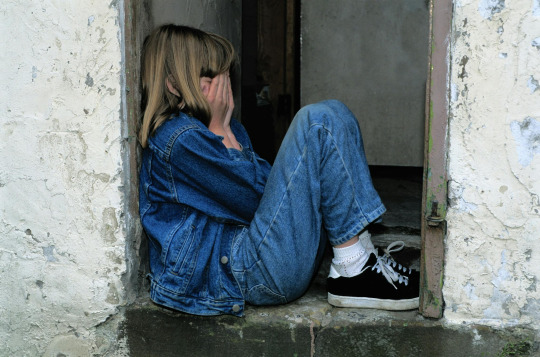
Social and Academic Consequences
Social Isolation:
Abandoned children may struggle with social interactions, leading to isolation and difficulty making friends. They might feel different from their peers who have intact family structures.
Academic Challenges:
Emotional turmoil can impact cognitive functions, leading to difficulties in concentration, motivation, and academic performance. These children might struggle to keep up with their schoolwork or show a lack of interest in learning.
Risk-Taking Behavior:
In an attempt to cope with their emotions, some children might engage in risky behaviors, including substance abuse, delinquency, or premature sexual activity.
Long-Term Effects
Chronic Insecurity:
The fear of being abandoned again can persist into adulthood, affecting personal and professional relationships. This chronic insecurity can hinder the ability to fully engage in life and pursue opportunities.
Interpersonal Difficulties:
Adults who were abandoned as children may find it challenging to trust and commit in relationships. They might have an increased likelihood of experiencing relationship instability and divorce.
Mental Health Disorders:
Long-term exposure to the trauma of abandonment can increase the risk of developing mental health disorders such as chronic depression, anxiety disorders, and post-traumatic stress disorder (PTSD).
Coping and Healing Strategies
Therapeutic Interventions:
Counseling and therapy can help children process their emotions and experiences. Therapists can provide tools and strategies to build self-esteem, manage anxiety, and develop healthy relationships.
Supportive Relationships:
Building strong, positive relationships with other family members, friends, or mentors can provide the emotional support and stability that abandoned children need.
Consistent Routines:
Establishing predictable routines and a stable environment can help mitigate some of the insecurity and instability caused by abandonment.
Encouragement and Validation:
Regularly validating a child's feelings and experiences, and encouraging their strengths and achievements, can help rebuild their self-esteem and sense of worth.
Conclusion
The impact of parental abandonment on children is profound and multifaceted, affecting their emotional, social, and academic development. Recognizing the signs and providing appropriate support is essential in helping these children navigate their challenges and build a healthier future. Through therapeutic interventions, supportive relationships, and consistent care, we can help mitigate the adverse effects and foster resilience in children who have faced the pain of abandonment.
Understanding and addressing the impact of parental abandonment on children is not only crucial for their immediate well-being but also for their long-term development and success. By offering compassion, stability, and professional support, we can make a significant difference in their lives.
#Long-term psychological effects of parental abandonment on children#How parental abandonment affects child development#Coping strategies for children abandoned by parents#Emotional impact of parental abandonment on children's mental health#Support for children dealing with parental abandonment
0 notes
Text
“Below are a nearly a dozen different factors that can sometimes influence a person's sense of sexual identity. Rather than saying any of these things "cause gender dysphoria," it is more accurate to say that they could contribute to a person feeling dysphoric about his or her body. Some individuals might find that some of the factors resonate deeply with them, while others might not relate to any of them. The goal isn't to provide an exhaustive list, but to encourage individuals who experience gender dysphoria to listen with compassionate curiosity to their own story.
Bullying
In an article on treating children who experience gender dysphoria, Dr. Kenneth Zucker shared the story of Frank. Frank was bullied by an older brother, generalized his aggression to all other boys, and began primarily associating with girls. By the age of five, he expressed a desire to become female, stating that all his problems would go away if he were a girl. At the age of seven, Frank's parents brought him to a gender clinic because he said that he thought he was a girl.
Dr. Zucker's treatment plan for him involved helping him to recognize that there are many ways to be a boy, and that there are likely some other boys in his social setting who aren't like his brother. Exposing Frank to boys like himself could "help him to develop a more nuanced understanding of gender: that there are different ways to be a boy, that one does not have to be a girl as a fantasy solution to cope with his difficulties with his aggressive brother."(24)
Similarly, parents of a twelve-year-old girl who had been bullied for going through an early puberty reported that "as a result she said she felt fat and hated her breasts," but learned online that hating her breasts was a sign of being transgender.(25) When young people are not given healthy strategies to address rejection, insecurities, abandonment, and verbal wounds, they may absorb the scorn of those who mistreat them. One cannot blame them for considering gender transition as a path away from their pain. As one noted, "I was very impulsive. I was so desperate for a fix that when I first found out that transgender might be a thing, I kind of latched on to it. ... The information that I got made it seem like I could change who I was."(26)
-Jason Evert, Male, Female, or Other: A Catholic Guide to Understanding Gender
—
Work cited:
24) K. Zucker et al., "A Developmental, Biopsychosocial Model for the Treatment of Children with Gender Identity Disorder," Journal of Homosexuality 59 (2012), 369-397.
25) Littman, "Parent Reports of Adolescents and Young Adults Perceived to Show Signs of a Rapid Onset of Gender Dysphoria," 16.
26) "DETRANSITION: My Story, and What I Wish I Knew." https://youtu.be/rC7EtIeWrPs?si=2QmY5pwGuFJnJrSo
—
For more recommended resources on gender dysphoria, click here.
#Mtf#Ftm#nonbinary#genderfluid#transgenderism#transgender ideology#Jason Evert#quotes#Male Female Other: A Catholic Guide to Understanding Gender
17 notes
·
View notes
Text
Dr. Karen Hawk on Helping Children Cope with Divorce
Divorce can be an emotionally tumultuous experience for families, and when children are involved, the impact can be profound. Young ones often struggle to understand the changes happening in their lives, and the emotional turmoil they experience can leave lasting effects. Dr Karen Hawk Psychologist Gilbert, a compassionate psychologist in Phoenix, specializes in helping children navigate the complexities of divorce with care, support, and effective coping strategies. Her counseling approach helps children process their emotions, adjust to their new family dynamics, and develop resilience in the face of significant life changes.
Understanding the Emotional Impact of Divorce on Children
Divorce can bring a range of emotional reactions in children, from sadness and confusion to anger and fear. These feelings are often amplified by the disruption of their daily routines, changes in living arrangements, and the emotional tension between parents. Dr Karen Hawk Psychologist Gilbert explains that every child reacts differently to divorce, depending on their age, personality, and the circumstances surrounding the separation. For younger children, the loss of the family unit and the uncertainty of what’s to come can be particularly overwhelming. Older children and teenagers might experience a mix of grief and anger, struggling with feelings of betrayal or abandonment.
Dr. Hawk emphasizes the importance of acknowledging and validating these emotions. Many parents may assume that children are not as affected by the divorce, especially if they are not openly expressing their feelings. However, children often internalize their emotions and may not know how to communicate their distress effectively. Dr. Hawk helps parents understand the emotional depth of their child's experience and provides strategies to create an open, supportive environment where their child feels comfortable expressing themselves.
Creating a Safe Space for Emotional Expression
One of the most crucial aspects of helping children cope with divorce is creating a safe and open space for emotional expression. Dr. Karen Hawk encourages parents to reassure their children that it’s okay to feel sad, angry, or confused, and that their emotions are valid. Through counseling, Dr. Hawk teaches children to recognize their emotions and express them in healthy ways. This can involve creative techniques like drawing, journaling, or role-playing, especially for younger children who may struggle to put their feelings into words.
In her counseling practice, Dr Karen Hawk Psychologist Gilbert helps children understand that their emotions are normal and natural during such a significant life transition. When children feel heard and understood, they are more likely to process their emotions in a healthy way, reducing the risk of long-term emotional difficulties. Additionally, Dr. Hawk works with parents to model emotional openness, encouraging them to share their own feelings in an age-appropriate manner. This can help children feel less alone in their emotional experience and encourage them to develop emotional intelligence.
Navigating New Family Dynamics
One of the major adjustments children face during a divorce is the change in family dynamics. When parents separate, children may find themselves moving between two households, adjusting to new living situations, and dealing with new rules or routines. Dr. Karen Hawk emphasizes the importance of maintaining consistency in a child’s life during this time. Stability in other areas, such as school, friendships, and extracurricular activities, can help children feel secure and reduce anxiety related to the divorce.
Dr Karen Hawk Psychologist Gilbert advises parents to communicate openly with their children about the changes ahead, ensuring that they understand what will happen and when. This clarity helps alleviate some of the uncertainty and gives children a sense of control over their environment. If possible, she encourages parents to collaborate on parenting plans that prioritize the child’s well-being, providing clear boundaries and expectations while also allowing for flexibility. Dr. Hawk’s goal is to ensure that children continue to feel loved, supported, and cared for, regardless of the changes in their family structure.
Supporting Children Through Conflict and Parental Tension
One of the most challenging aspects of divorce for children is the ongoing conflict or tension between their parents. Dr Karen Hawk Psychologist Gilbert notes that children are incredibly sensitive to emotional cues, and when parents are hostile or communicate negatively about each other, it can create feelings of guilt, confusion, and loyalty conflicts. Children may feel torn between their parents, unsure of how to navigate their relationship with each one.
Dr. Hawk works with parents to minimize conflict in front of the children, encouraging them to maintain respectful communication, even when they may not get along. She advises parents to avoid putting children in the middle of their disputes, as this can increase emotional strain and complicate the child’s ability to process the divorce. In her counseling, Dr Karen Hawk Psychologist Gilbert helps children understand that they are not responsible for the divorce and that they can maintain loving relationships with both parents, even if the parents are no longer together.
Helping Children Build Resilience
Resilience is the ability to adapt and bounce back from adversity, and it is a critical skill for children coping with divorce. Dr. Karen Hawk works with children to develop coping skills that will help them manage the emotional challenges of their parents’ separation. These skills include emotional regulation, problem-solving, and healthy coping mechanisms like mindfulness and relaxation exercises.
Dr. Hawk emphasizes the importance of reinforcing the child’s sense of self-worth and helping them find positive outlets for their emotions. Whether it’s engaging in physical activities, expressing creativity through art, or simply talking to someone they trust, children can learn to navigate their emotions in constructive ways. Karen Hawk Gilbert teaches parents to model these coping strategies as well, providing children with the tools they need to face challenges in the future. Building resilience helps children understand that while the divorce may be painful, they have the strength and resources to move forward.
Promoting Positive Relationships Post-Divorce
Once the initial shock of the divorce begins to settle, Dr Karen Hawk Psychologist Gilbert focuses on helping children establish positive relationships with both parents and other important figures in their lives. Even though divorce can disrupt the family unit, Dr. Hawk believes it’s essential for children to maintain strong, loving connections with both parents whenever possible. This requires collaboration between parents to support their child’s emotional needs and foster a sense of continuity and love in both households.
Dr. Hawk encourages parents to work together to ensure that their children feel safe, loved, and supported in both environments. She works with children to help them understand that while their parents may no longer be together, both parents continue to care for them deeply. Dr. Hawk’s approach helps parents navigate co-parenting challenges with a focus on the child’s emotional well-being and long-term adjustment.
Conclusion: Providing a Foundation for Healing and Growth
Divorce is undeniably one of life’s most challenging experiences for children, but with the right support and guidance, children can navigate this transition and emerge stronger and more resilient. Dr. Karen Hawk’s compassionate counseling in Phoenix offers children the tools to process their emotions, adapt to new family dynamics, and build resilience in the face of change. Her approach not only supports children during this difficult time but also empowers parents to be the best advocates for their children’s emotional well-being.
If you are navigating the challenges of divorce and want to support your child’s emotional health, Dr. Karen Hawk can provide expert guidance and counseling. Through her evidence-based techniques and compassionate approach, she helps families heal and move forward together, fostering healthier relationships and emotional stability for everyone involved. With Dr. Hawk’s support, children can learn to cope with the changes brought on by divorce and develop the emotional resilience needed to thrive in the years to come.
0 notes
Text
5 Reasons Why Young Adults get Depressed
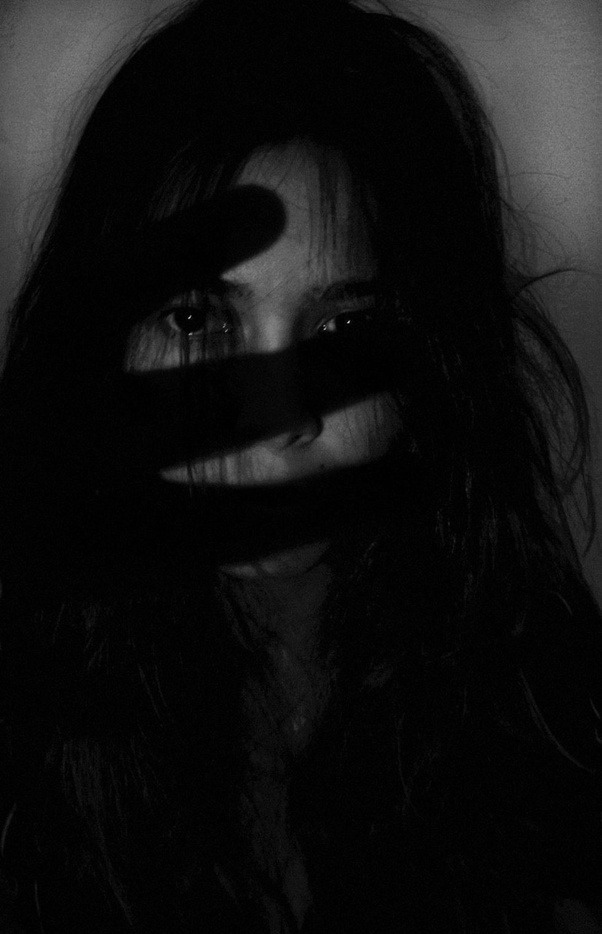
There is a gross misperception that when an individual enters young adulthood (between the ages of 18 to 29) they transition into a state of bliss, fun and contentment. On the contrary, it can be extremely difficult to adjust when transitioning from adolescence into adulthood. For many in that age group it is a time of major adjustment, self-discovery, and uncertainty about life. Studies show that mental health problems, social stress and substance abuse issues are prevalent within that age group. There are many factors that may trigger depression among young adults, five of which are mentioned below:
1. Loss of Significant Friendships
Oftentimes not much thought is given to the tremendous value of friendships in the life of a young adult. Transition to college seldom results in separation between friends as elementary and middle school disperse to various colleges and universities. Additionally, after graduating from college the young adult may return to native town and may be losing friends gained during undergraduate studies. Finding authentic, valuable, selfless friendships can be challenging. This separation can be extremely difficult as, with the loss of support comes feelings of loneliness, sometimes abandonment and depression.
2. Increased Responsibilities
The demands of transitioning into adulthood can be quite overwhelming. This task can be daunting especially for those who were sheltered child by ‘helicopter parents.’ In addition to having to do laundry, prepare meals and pay bills, a young adult also has to take on the task of parenting him or herself, find employment and may have to support him or herself financially. This stage of life is also where those who are in entry-level jobs struggle to adjust to structure and accountability of the position. Some may get married or become a parent which can further complicate the individual’s ability to adjust to major life changes. Increased stress is especially challenging to those who are ill-equipped with healthy coping strategies and independent living skills.
3. Living Their Parents Dream
Parents and well-wishers often say their goodbyes to college students with a complimentary directive to ‘ace all classes, stay out of trouble and make us proud.’ Many young adults who are first-generation college students say that there’s even greater pressure placed on to succeed so they can earn a substantial income to care for the extended family. Such a charge to achieve places an enormous burden on the individual. The insurmountable pressure to live up to the expectations and traditions imposed loved ones has contributed to much psychological mayhem, substance use and mental health problems such as depression and anxiety in young adults.
4. Uncertainty About the Future
Do you remember the first time someone asked you about your professional aspiration? It is common practice for adults to ask children what they would like to be. If that child responded with uncertainty, he or she would receive a judgmental disapproving stare and advice about the ideal professional path that should be taken. Very rarely are children told that it is ok to be uncertain about the future. Although well intended, this practice injects fear of failure and confusion into the minds of so many young adults who are made to feel that uncertainty about their professional future is a character flaw.
5. Fear of Failure
It is customary to condition individuals to fear failure. By age 18 one will have witnessed and possibly experienced dire consequences for failure. Many of us were never taught to embrace failure and use it as an opportunity to examine underlying causes for the failure, re-strategize and keep trying until we succeed. High expectations, uncertainty about the future, and self-doubt can inhibit a young adult’s ability to maximize his or her potential. The fear of failure also contributes to self-doubt, anxiety, depression, and perfectionism.
Young Adults who struggle with Depression can seek the following remedies to help them cope with life’s stressors:
Individual Therapy to address irrational thoughts about self and develop self-assertion skills
Life Coach for assistance to develop power skills
Psychiatric Care
Access a Support Group
Set Personal Boundaries for Family and significant others who impose expectations contact us.
1 note
·
View note
Text
Attachment And The Crucial Role Of Early Parenting In Shaping Our Relationships
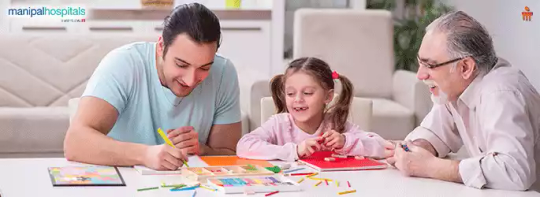
Have you ever caught yourself questioning why you find comfort in people? Or why you cannot, for the love of God, have an intimate relationship with family, friends or even a romantic partner? Why do some of us have the desperate need to be loved even if it means compromising ourselves? Why do we constantly seek validation and reassurance? Why do we struggle to confront unpleasant and unwarranted situations?
In the early years of our lives, our interactions and experiences give shape to our thoughts, emotions, and behaviour. They influence our perception of the world as a safe place, brimming with life and adventure or as a dangerous and fearful place.
Visit a top hospital if you are interested to know more about the role of early parenting and attachments.
Let’s Look at an Example!
Have you seen infants with a strong attachment to their favourite toy or blanket? Though it is not their mother or father, they have positive feelings of love, affection and comfort associated with it. As they grow and become more positively aware of themselves and explore the world around them, they can abandon these objects. Lauren Schapiro, a psychotherapist explains. “Stuffed animals serve many different purposes for children and even adults. Some use stuffed animals to connect them to important relationships or past events in their life. Others may use them as a coping strategy when dealing with life stressors. Regardless of the reason, it is completely normal.”
What is Attachment?
We form a close emotional bond or attachment with our parents and caregivers who shower us with love and affection and reciprocate our gestures as babies. We seek comfort in their arms and feel happier and more secure in their presence. While this may seem insignificant, it is in fact a foundation on which we build a sense of trust and an optimistic expectation of the world.
What is the Role of Early Parenting?
"It's essentially how we were emotionally cared for—or not cared for—as children growing up," Lippman-Barile explains.
This goes to show that parenting styles are very crucial for the optimal development of a child. A child that is securely attached to the parent or caregiver is open to experiences while having the assurance of returning ‘home’. When parents are sensitive, affectionate and accepting, they raise confident children ready to take on the world.
On the other hand, parents who are overly strict disciplinarians or constantly criticize and nit-pick, raise children who are anxious and constantly fear the real world and hesitate to go beyond their comfort zone. They throw tantrums and cry when separated, constantly demanding attention. Such an insecure attachment can emerge in many forms including anxious or ambivalent attachment, avoidant attachment, and disorganized attachment.
Secure Attachment
“The best inheritance a parent can give their child is their time each day.”
How does secure attachment show up in adults?
Children who live in a nurturing and supportive environment do not shy away from intimate relationships.
They are open about their feelings and emotions, maturely conveying them.
They can set healthy boundaries for themselves without experiencing overwhelming amounts of guilt.
They can bond in healthy and longer-lasting relationships, modelling the ones they grow up around.
They have a strong social support system and have empathy and compassion towards themselves and others, thus showcasing powerful intra and interpersonal intelligence.
They show higher emotional intelligence and self-confidence.
Anxious Attachment
When a child’s basic comfort needs are ignored and overlooked, he develops extreme distrust in the world and the people around him. This is manifested in their adulthood as an anxious attachment.
Parents who show inconsistency in meeting the belongingness and comfort needs of their children make them more vulnerable to such an insecure attachment. They occasionally express love and affection towards their child, providing a thriving environment. While sometimes, they turn a deaf ear towards their emotional and physical well-being or appear intrusive and over-indulging.
These adults show unhealthy levels of anxiety and insecurity in dealing with others or entering an intimate relationship.
They crave reassurance and validation but also tend to feel unworthy of love.
They assign excessive importance to others and indulge in people-pleasing behaviour.
They may appear desperate and clingy, while in reality, they fear abandonment.
They are often overwhelmed by uncontrollable feelings of jealousy, insecurity and over-possessiveness.
They seem to be moody or unpredictable.
They are in a constant state of hypervigilance, anticipating instability in relationships.
Dominant negative self-image.
Avoidant Attachment
Insecure attachment may show up as avoidant attachment, in which the adult often suppresses emotions and tends to avoid uncomfortable situations in relationships as they were neglected as a child by the caregiver or parent. Such parents are unavailable, emotionally distant and forsake their responsibility to nourish the child. They may discourage the expression of emotions and over-discipline their children and resort to punitive measures.
These adults escape or evade unpleasant situations and are unwilling to face them.
They often describe others as ‘clingy’ or ‘needy’ and are afraid of intimacy.
They face difficulty in entering relationships and prefer independence. Therefore, they tend to have more ‘flings’ and ‘situationships’.
They are indifferent to their partner’s emotional needs and are willing to compromise their relationships.
Dominant negative self-image.
Disorganized Attachment
Disorganized attachment is a result of being exposed to a chaotic and abusive environment as children due to which they associate feelings of anxiety and fear with their caregivers and parents. Parents are often overworked and stressed and are therefore unable to channel their negative emotions appropriately. Often, the caregiver is not their parent, and thus is ‘unfamiliar’. As a result, there is a deep-rooted conflict in children’s minds who grow apart due to the lack of a ‘parental figure’.
They have disorganized opinions of love and affection.
They feel unworthy of love, and crave intimacy but are often confused and therefore sabotage their chances.
They are unable to express themselves openly and without the fear of being judged or told off.
They have a fear of being rejected or hurt by their partners and therefore withdraw themselves despite their longing for love.
They have a negative self-image and are unable to trust others.
The role of parents in their children’s lives is undeniably essential. While it is natural and okay to make mistakes as a parent, it should be remembered that it should not compromise the child’s happy and healthy development. We often underestimate the value of just being there for someone, especially our kids. It is our responsibility as parents, to ensure that our kids grow with the ability to find beauty in the world; bond into strong, nourishing relationships; feel loved and appreciated; feel safe; express emotions, whether good or bad; show empathy and compassion; to face any challenge.
Because as Frederick Douglass once said, “It is easier to build strong children than to repair broken men.”
Consult a psychologist in Whitefield if you require counselling on parenting or any other mental health-related issues affecting your child.
0 notes
Text
Conduct Disorder - Why Children Get Aggressive
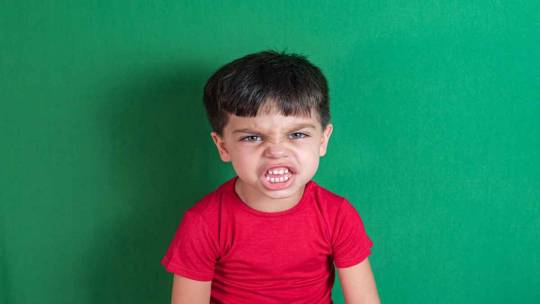
Conduct disorder is a psychological and behavioral issue typically diagnosed in childhood or adolescence. It is a persistent pattern of behavior that violates the basic rights of others or societal norms and rules. Individuals with the problem often engage in aggressive and destructive behaviors. These are usually physical violence, bullying, animal cruelty, property damage, theft, and deceitful or manipulative acts. It is an increasingly prevalent mental health disorder with a pattern of persistent behavior. It violates social norms and the rights of others. Symptoms of Conduct Disorder can manifest in a variety of ways. These range from hostile, aggressive, and destructive behavior to deceitfulness and theft. Unsurprisingly, this reality has profound effects on those living with the disorder as well as having its impact – both directly and indirectly. Understanding the Behaviour of Children As a parent, understanding a child's struggle with Conduct Disorder can feel like wading through murky waters. It is an often-misunderstood condition, marked by persistent aggressive and other disruptive behaviors. It is a violent condition that disrespects the rights of others and goes against accepted norms. The behaviors of children with Conduct Disorder are perplexing and seemingly irrational. It ranges from extreme risk-taking and reckless abandonment of rules to self-harm and other violent tendencies. But beneath the surface, there are often psychological and emotional factors at play, such as trauma, depression, and anxiety. It is essential for parents to recognize the underlying causes of Conduct Disorder in children. They must seek professional help for coping strategies and treatment options.' 1. Definition It is a psychological condition in which children have difficulty following rules and behaving in socially accepted ways. It can cause disruptive and even violent behavior, including fighting, stealing, and property destruction. Parents and caregivers may find it difficult to understand and manage CD. That is why it is important to be aware of the various coping strategies available. These range from cognitive-behavioral therapy to family therapy; no single approach works for everyone. To support their child, parents, and caregivers should be prepared to use a variety of approaches to help their child manage their disorder and lead a more productive life. 2. Signs and Symptoms Conduct Disorder in children is a serious behavioral issue that should not be taken lightly. Symptoms range from aggression, destructive behavior, and deceitfulness. Often, these behaviors are seen as part of typical development in children, however, if these behaviors persist and become more severe, they can be classified as a conduct disorder. The National Institute of Mental Health provides more information on signs and symptoms of conduct disorder as well as treatment options. Treatment for this problem can involve therapy, medications, or a combination of both. If you or someone you know is struggling with Conduct Disorder, it is important to seek professional help. Some Common Signs and Symptoms - Aggression towards people or animals: This may involve initiating physical fights, bullying, cruelty towards animals, or forcing others into sexual activity. - Destruction of property: Individuals with the issue may intentionally damage or destroy property belonging to others or themselves. - Deceitfulness or theft: Lying, shoplifting, or breaking into houses or cars are examples of behavior associated with conduct disorder. - Serious rule violations: Repeatedly running away from home, truancy, or disregarding curfew and other rules established by parents or authority figures. - Lack of empathy: Individuals with conduct disorder may demonstrate a lack of remorse or empathy for the harm they cause to others. 3. Causes Conduct Disorder in childhood is complex. While no single cause exists, several factors may lead to a struggle, such as genetic inheritance, environmental influences, and differences in the brain. It's important to note, however, that having any of these doesn't guarantee a diagnosis. Symptoms may include aggression, defiance of authority, bullying, stealing, and property destruction. If these behaviors become persistent, it could be a sign of a deeper issue. 4. Treatment When treating Conduct Disorder in children, no single approach works for everyone. A combination of therapies, like family therapy, cognitive-behavioral therapy, and sometimes medication, helps manage it. Family therapy teaches parents how to respond to their child's behavior, while cognitive-behavioral therapy helps the child understand and control their emotions and impulses. Medication may be prescribed in more severe cases. It's challenging, but with the right combination of treatments, a child can learn to manage their Conduct Disorder. 5. Living with Conduct Disorder Living with Conduct Disorder can be tough for children and families. But there are positive strategies that can make it more manageable. Remember, children with Conduct Disorder aren't bad, they are dealing with a medical condition that requires intervention. Creating a supportive environment, maintaining consistent rules and expectations, and helping the child develop problem-solving skills can help them cope and develop better social behaviors. Communication between the child and their caregiver about feelings, needs, and frustrations is critical. Additionally, involving professionals such as child psychologists or therapists can equip the child with the tools they need for success. Positive Strategies for Children with Conduct Disorder can significantly improve a child's quality of life and help them become successful adults. 6. Support When supporting a child with Conduct Disorder in Children, remember it's a complex condition. While there are various treatments, developing a positive relationship and providing a secure environment is key to managing it. Involving family and health professionals can help work out the best approach. To understand and support a child, tailor treatments to their individual needs and challenges. 7. Prevention It's essential to recognize potential risk factors for conduct disorder in children. While there is no one-size-fits-all solution, poverty, unstable family dynamics, a lack of social support, and neurological issues can all increase the risk. To reduce the likelihood of developing this disorder, parents and caregivers should create a stable and supportive environment and give children access to mental health services. Taking these steps can help children thrive and boost their overall well-being. Last words Conduct disorder is a serious mental health condition that can cause significant disruption in a person's life, and those around them. It is a disorder that can manifest itself in many ways, from aggressiveness to stealing, and has an effect on how a person interacts with their family, peers, and the broader community. It is a complex disorder that requires a comprehensive and individualized treatment plan to be effective, and it is important to recognize that it is a disorder that is capable of being managed with the right help. With the proper support, those affected can learn to navigate their challenges and live a life of quality and purpose. Image by user3802032 on Freepik Read the full article
0 notes
Text
The Impact of Parental Abandonment on Children: Understanding and Supporting Young Lives
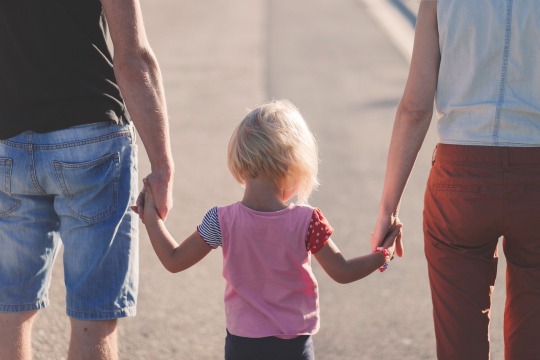
Parental abandonment is a profound and often traumatic experience for children. Whether due to physical absence, emotional neglect, or both, the effects can ripple through a child's life, impacting their emotional, psychological, and social development. This blog will explore the various dimensions of parental abandonment, Parental abandonment's impact on children, and ways to support those affected.
Understanding Parental Abandonment
Parental abandonment can take many forms, including:
Physical Abandonment: When a parent leaves the family home and ceases to be involved in the child's life.
Emotional Abandonment: When a parent is physically present but emotionally unavailable or neglectful.
Financial Abandonment: When a parent fails to provide financial support, leading to instability and insecurity.
The Emotional Impact
Children who experience parental abandonment often grapple with a range of intense emotions, including:
Feelings of Rejection and Worthlessness: The absence of a parent can lead children to internalize the abandonment, believing they are unworthy of love and attention.
Anger and Resentment: Abandoned children may harbor deep-seated anger towards the absent parent, which can manifest in behavioral issues.
Fear and Anxiety: The uncertainty and instability resulting from abandonment can lead to chronic anxiety and fear of further loss or rejection.
Psychological Effects
Parental abandonment can have lasting psychological effects, such as:
Attachment Issues: Children may struggle to form secure attachments with others, leading to difficulties in relationships later in life.
Low Self-Esteem: Persistent feelings of unworthiness can erode a child's self-confidence and self-esteem.
Depression: The emotional toll of abandonment can contribute to depressive symptoms, including sadness, hopelessness, and lack of motivation.
Social Consequences
The social ramifications of parental abandonment include:
Trust Issues: Abandoned children may find it challenging to trust others, impacting their ability to form healthy relationships.
Behavioral Problems: Anger and confusion can lead to acting out, delinquency, and difficulties in school.
Isolation: Feelings of shame and unworthiness can cause children to withdraw from social interactions, leading to loneliness and isolation.
Supporting Children Affected by Abandonment
Understanding the impact of parental abandonment is the first step in providing effective support. Here are some ways to help:
1. Provide Emotional Support
Offer consistent emotional support and reassurance to help children feel valued and loved. Encourage open communication and provide a safe space for them to express their feelings.
2. Seek Professional Help
Therapy can be a valuable tool for helping children process their emotions and develop coping strategies. Consider engaging a child psychologist or counselor experienced in dealing with abandonment issues.
3. Foster Stability and Routine
Creating a stable and predictable environment can help mitigate some of the anxiety and insecurity caused by abandonment. Establish regular routines and ensure the child feels secure in their daily life.
4. Encourage Positive Relationships
Support the development of healthy relationships with other trusted adults, such as relatives, teachers, or mentors. Positive role models can help fill the void left by the absent parent.
5. Build Self-Esteem
Engage in activities that boost the child's self-esteem and sense of accomplishment. Praise their efforts and celebrate their successes to help counteract feelings of worthlessness.
6. Educate About Abandonment
Help the child understand that parental abandonment is not their fault. Educating them about the broader context of the situation can alleviate some of the self-blame and confusion they may feel.
Conclusion
Parental abandonment is a profound and challenging experience that can significantly impact a child's emotional, psychological, and social development. By understanding the effects and providing targeted support, caregivers, educators, and mental health professionals can help mitigate the negative consequences and promote resilience and healing in affected children. Through consistent love, support, and positive reinforcement, we can help these children build a brighter and more secure future.
#parentingtips#parenting#family#familia#parent#impactofparentalabandonmentonchildren#parental abandonment
1 note
·
View note
Text
Tips for Living With ADHD (From Someone Who Actually Has It)
There is a lot of advice floating around online for how to manage the symptoms of ADHD.
Most of it is bad.
A lot of the advice available for coping with ADHD has been written by people who don’t actually have it. Much of it is either aimed at parents raising ADHD children, or it simply amounts to “just try harder and figure out how to remember things better”. It’s hard for people who don’t have ADHD to understand that there’s more to it than “being easily distracted”, and the advice they give for managing the disorder is sometimes woefully out of touch.
Luckily, I have ADHD, and I’ve had to deal with it all my life. ADHD has not prevented me from getting a master’s degree, writing a novel, keeping my apartment clean or advancing in my career, because I’ve figured out some coping strategies like:
Train yourself to do the “keys, phone, wallet” dance. Misplacing things sucks, and it happens a lot with ADHD. To keep at least the important things from going missing, I have taught myself to physically tap my keys, wallet and phone before I leave any location. Getting into this habit took a few weeks, but now it’s muscle memory - and it’s saved me a lot of headaches over the years.
Start a Bullet Journal or find a good day planner. My bullet journal is my life. For those of you who aren’t familiar with them, bullet journals are basically grid notebooks written with a special system that lets you quickly keep track of and organize all the things you need to remember. Their customizability lets you organize things in a way that makes sense to your brain (and there’s no need to make them as fancy as the ones on Instagram). Plus, the fact that it’s not an app or online tool helps me avoid distraction.
Do a daily 15-minute sweep of your apartment. Household chores can quickly get away from you, until your apartment is so overwhelmingly gross that you don’t even know where to start. Keep things to a dull roar with a fifteen-minute daily sweep - bag up garbage, move the dishes to the kitchen, throw laundry into a hamper, wipe up obvious spills. When your space is less overwhelming, it’s easier to tackle bigger chores when you need to.
Set reminders to reply to emails and messages. If I don’t answer a message immediately, under normal circumstances, there’s a 50/50 chance I’ll never remember to answer it. If I know I need to reply to a message, I’ll set a quick reminder in my phone to respond - Siri can set reminders for me instantly, and it helps a lot with communication.
Prioritize tasks and do the most important ones first. My brain has a limited ability to concentrate on tasks that I’m not hyper-fixated on. Attention is a finite resource for me - once I start to get tired or burnt out, the odds of me completing a task I’m not interested in drops to almost nothing. Order your tasks by importance, not difficulty; sometimes I’m only able to do 1-2 very simple things in a day, and it’s important to make sure those are the things that most needed to get done.
Use the Pomodoro method for getting things done. I need pressure and deadlines to get things done, which is sort of difficult to replicate after college - the only person who cares if I work on my art or write a novel is me. So I use the Pomodoro method - this is basically where you set a timer for 25 minutes, work until it goes off, set a time for 5 minutes, relax until it goes off, and so on. There are even apps like “Focus To-Do” that automatically use Pomodoro timers and can even track how many you do on each task per day.
Put reminders of daily tasks in places where you can see them. I have several houseplants, and the only reason those houseplants are alive is because they have brightly-coloured sticky notes on them that say WATER ME EVERY FRIDAY. Putting up visual reminders might seem tacky or childish, but if that’s what works for you, then that’s what you need to do. Putting a chore chart for yourself on the fridge is way less embarrassing than getting a pest problem because you lost track of chores.
Tackle chores and cleaning in stages. Deep-cleaning my whole apartment in one day is simply not going to happen. It’s just not. So when it’s time to deep-clean, I spread it out in stages - one day is the day to tackle the fridge, the next day is the bathrooms, the day after that is closet organization, etc. Breaking things into manageable chunks is how I’ve tackled everything from my graduate thesis to moving - I accept that I need to spread big tasks out across more days than other people do, and adapt accordingly.
Audiobooks and podcasts are your friend. If I’m doing a task that doesn’t require a lot of concentration - like mopping, or dishes, or walking the dog - my mind wanders... and it often wanders to another task I could be doing, causing me to abandon what I’m working on. I’ve found that the best way to prevent that is to keep my mind occupied. Throwing on some headphones and listening to an audiobook (which I rent from the Libby app for free!) has been a win-win situation for me; it helps me stay on-task, and it helps me reach my reading goal every year.
ADHD can make it difficult to thrive in a world that wasn’t built for our brains. But when you find the right strategies, it’s possible to accomplish your dreams and navigate the world in your own way.
#askmissmentelle#missmentelle#adhd#living with adhd#mental health#mental illness#adhd inattentive#adhd post#strategies & tips
2K notes
·
View notes
Text
His Dark Materials Thoughts: Daemons and Disability / Neurodivergence
More stupid His Dark Materials thoughts and headcanons because I still can’t get over this series.
I’m really curious how various disabilities would interact with having a daemon. I’d guess that for a lot of conditions the daemon could basically fill the role of a service animal, especially if the person had the condition from childhood so they could settle in a form that was capable of helping - e.g. daemons assuming forms with strong senses of smell to check for allergens. And this would probably be true for some neurological conditions where there’s something physically messed up in your brain.
However, I think for neurodivergency, it’s different: if the human is neurodivergent their daemon is neurodivergent as well. And while a human and daemon are “one being,” daemons still have their own personalities and emotional needs.
Using autism as an example because I’m autistic and can speculate based on my own experiences:
Autistic people are usually very close to their daemons, even by the standards of the setting, because while anyone’s daemon inherently understands them better than other people do, the gap is much, much wider for ND people. Real talk, I think I was drawn to this series and the concept of daemons so strongly because the idea of a companion I could fully trust and interact with without the constant fear of breaking some unknown and unspoken rule and who fully empathized with me was something I wanted soooo badly.
A lot more sensory information is “transmitted” between human and daemon than most people notice because the brain tends to filter it out. Autistic people’s brains aren’t as good at filtering out “junk” sensory info though, and this includes what comes through over the bond between them. You can’t actually see through your daemon’s eyes but autistic people tend to feel shared sensations more intensely and pick up on things like smells and textures that a neurotypical brain would tune out (and this works in both directions). This makes autistic people more vulnerable to sensory overload than in our world.
Sometimes only one of the pair is verbal, or at least verbal with others / much more comfortable talking to others. If it’s the human, people tend to not notice because “daemons should be seen and not heard” is kind of the norm in the setting but if the daemon is speaking for the pair most of the time it’s seen as weird. Some autistic people may also be more comfortable talking to other people’s daemons than to the humans, which isn’t technically part of the taboo but it’s pretty frowned upon.
For both tactile-seeking and tactile-defensive people, the daemon’s settled form is often determined by the need for physical affection - either because as they grow into teenagers it becomes less socially acceptable to touch other people as much as they need to, or because the only touch that feels safe for the pair is with each other. A settled form doesn’t always follow the human’s preference, but is always a form the daemon is comfortable with and likes. Daemons settling in forms their human actively hates is rare, and usually means there was already serious conflict between them with the human refusing to accept their nature - i.e. sailors’ daemons usually take seabird forms or mammals like otters or minks that can stray away from the water, settling in a dolphin form was noteworthy for a reason because it’s such a drastic act, and IMO that was probably caused by the human trying to abandon the sea entirely and fighting with his own daemon about it until she was like “Let’s see you take us away from the sea now!”
But anyway: daemons don’t just settle in forms based on symbolism or social convention if it’s going to make both them and their humans miserable and/or mess up their relationship IMO, and usually they show a preference for forms similar to their settled one in the years leading up to settling (e.g. Pantalaimon clearly liked his stoat/ferret and wildcat forms and mostly took other ones for reasons of practicality and convenience, and I said this in another post but I think he became a pine marten because it was the closest he could get to combining the two). If a pre-adolescent human and daemon are super cuddly with each other and that touch is really important to them, the daemon will probably settle in a form that’s compatible with that. It’s rare for autistic daemons to settle as something as small as a mouse where they could only be carefully pet with one or two fingers, for example, and they usually take mammalian or sometimes avian forms.
Brushing a daemon’s fur, and other techniques such as joint compression that are hard for a person to perform on their own body, can help both of the pair calm down and cope with sensory issues.
Unfortunately, given how fucked up the culture in Lyra’s world is, I shudder to imagine how they treat neurodivergent people. I can totally imagine people treating this closeness as the cause of autism and not a symptom, and treating it as a child “being socially impaired because they only interact with their daemon / let their daemon do too much for them and never learn to socialize with other people.” Aside from attempting to cure autism with Intercision, there are probably a bunch of horrible, abusive treatments passed off as “therapy,” like forcing children to do therapy sessions with their daemon trapped on the other side of an opaque, soundproof wall (doesn’t interfere with their bond if it’s within the separation limit, but keeps them from seeing / hearing / touching each other), caging the daemon, muzzling them to keep them from speaking for their human, or even not letting them sleep in the same room.
Another common problem is parents / educators treating an autistic person’s daemon like a service animal and offloading their responsibilities on them. Just expecting them to handle something like a meltdown or panic attack by themselves because “You’re part of them, you understand them!” and ignoring that the daemon also has fears and anxieties and sensory issues.
Expectation: Your autistic child’s daemon understands them better than you ever could and will be able to quickly and discretely calm them down from a meltdown / sensory overload without you needing to get involved and actually do your job as a parent.
Reality: You have two autistic children who share a soul and feel each other’s emotions and pain, and one of them likely has at least one sense that’s way more sensitive than a human’s. They can certainly be a source of comfort and support to each other, and can pick up on each other’s warning signs and remind each other to use coping strategies / get out of stressful situations and not try to “push through,” but this is a skill that takes time and maturity to learn, and it only works before the pair are completely overwhelmed. As stated above autistic people feel sensations and emotions from their daemon extra-intensely, and vice versa. A full-on meltdown or panic attack is such an overpowering flood of negative emotions that, combined with the stress of whatever caused the meltdown in the first place, usually just overwhelms both partners, especially in children. The best you can hope for is whichever one holds it together a bit longer is able to help their partner into a safe place and ask someone for help. Even if the daemon (or human) doesn’t have a meltdown their emotional battery will still be absolutely drained for probably the rest of the day.
178 notes
·
View notes
Text
BnHA Chapter 302: As the Todoroki Turns
Previously on BnHA:

Today on BnHA: We have a very fun chapter in which (1) Shouto grows up lonely on account of his parents being worried that his siblings will literally try to kill him, (2) Natsu and Fuyu grow up neglected on account of not being special and/or self-destructive enough to attract attention, (3) we get to revisit all of that exciting spousal abuse from chapter 39, and (4) Touya burns to death right on cue, pretty much exactly like we expected it to happen. Thankfully since this is a shounen manga, Horikoshi finds some hope in all this misery as the Todoroki family rallies together, with Shouto getting his long-overdue credit for being a perfect sweet angel who put up with all of this shit for sixteen years and somehow came out of it strong and kind and empathetic and determined. Anyway, so that flashback was a barrel of laughs. But now that it’s over, we can put all of that angst behind us, and move on to... well I guess, probably, more angst. Look, we’re short on variety at the moment. Bear with it.
ouch. we knew this was coming, but still
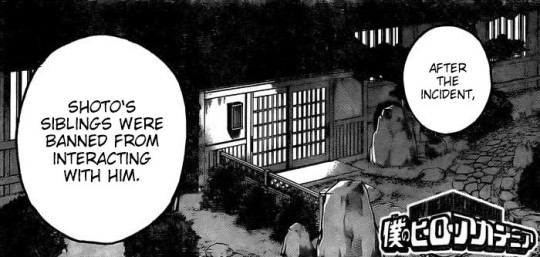
A+ parenting move there. “ho boy, our eldest just tried to murder our youngest, now what? hmm how about we isolate our youngest from all human contact”
though in their defense, we probably shouldn’t have expected this rabidly strength-obsessed fire man and his wife who was groomed since childhood to obey her family’s whims to have any idea of how to raise stable, well-adjusted offspring
SERIOUSLY YOU GUYS
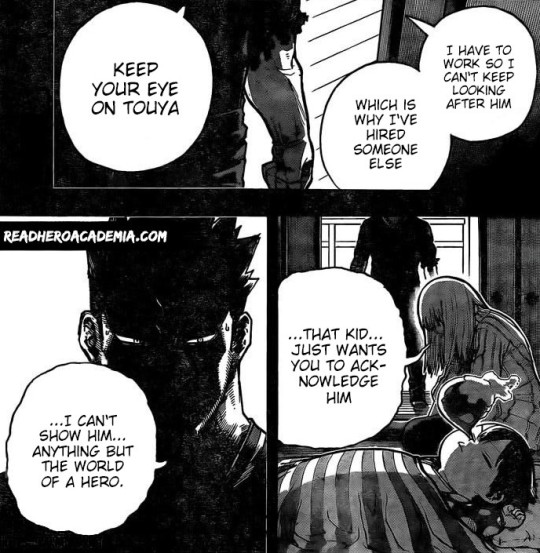
this is a perfect example of Enji’s tragically self-revolving viewpoint right here. just because being a hero is your entire world doesn’t mean you can just excuse yourself from anything outside of that and act like it’s out of your control. “alas, all I care about is hero stuff and my son can’t be a hero, we are doomed to inhabit two different worlds” no you jackass, it’s called having more than one hobby?? figuring out how to spend some time with your son that doesn’t involve training?? the same exact thing you were telling him to do last week, while ignoring that you’ve never done that yourself in your life??
that said, yet again we have that complexity though because it’s obvious that Enji at least on some level is aware of his own flaws, even though he seems unwilling or unable to confront them. honestly, from what we’ve seen so far, Enji’s obsession with surpassing All Might might be more accurately called an addiction. he literally can’t let go of it even though he’s fully aware of how it’s slowly destroying his life. and so in the same way that a lifelong smoker or alcoholic might tell their child to stay away from cigarettes and booze, Enji tells Touya not to follow down the same path as him, even though he himself doesn’t know how to leave that path. so yes, it’s hypocritical as fuck, but there’s also an element of helplessness there as well because Enji literally doesn’t know how not to be like this
though all the same he sure could stand to put in more than just a token effort. but it is what it is, and we already know how much he’ll come to regret it
and meanwhile Baby Shouto has frozen his sleep bubble with his quirk lmao. so I guess his quirk did come in early. that’s a recipe for chaos right there
once again Shouto is ruining every single dramatic panel in this flashback

this was so dark and intense... and then I spotted the lil bubs in the corner. Horikoshi please control yourself
“some hero you are, running away” and then all of a sudden, “FIVE YEARS LATER” lol what. OKAY THEN
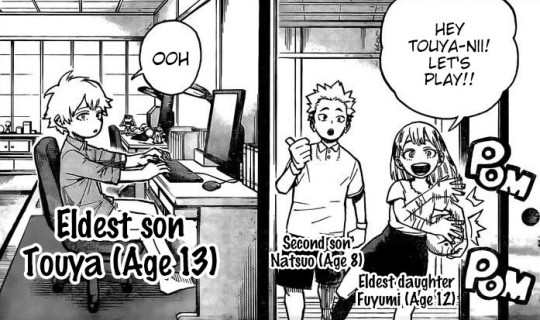
(ETA: love the confirmation that eight-year-old Natsu comes from the Iida school of puberty and is basically a fully grown man, and meanwhile Touya comes from the hobbit school of puberty and has been perpetually eight for the past five years.)
“HEY BIG BRO WANNA COME RECREATE AN ICONIC FLASHBACK SCENE WITH US. WE’VE GOT THE SOCCER BALL RIGHT HERE, BUT HURRY UP OR WE’LL BE TOO LATE FOR SHOUTO TO WALK ON BY AND STOP TO LOOK”
lol and that’s literally the next three panels. but Horikoshi did add this extra bit after Endeavor starts to drag Shouto away
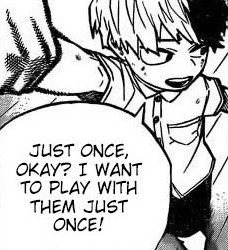
seriously Enji what the hell did you expect was going to happen here. “Touya went nuts and tried to kill his little brother out of jealousy, so let’s make it clearer than ever that Shouto is the important child and all the other children are just rejects. this will definitely not make the problem 100x worse, and will surely lead to Touya giving up and living a happy life, having been emotionally abandoned by the person he admired more than anyone.” good for you pal you figured it all out. no need for that plan b, “we all just go to therapy”
anyway so he’s telling Shouto he can’t play because he needs more endurance training. and meanwhile Touya’s patented Todoroki Drama Genes are going through puberty as well
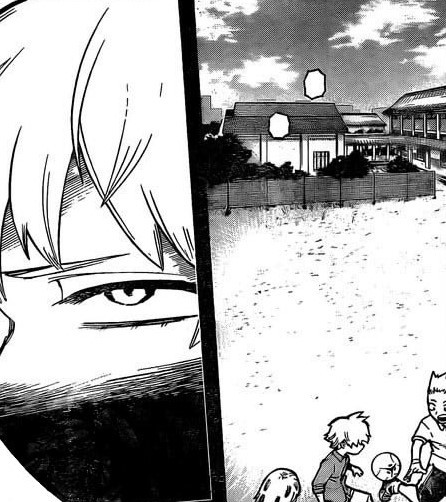
definitely the face of a happy, emotionally stable child who’s not still plotting to murder his younger brother in his sleep
“WELL ACTUALLY MAKESTE” lol I stand corrected??
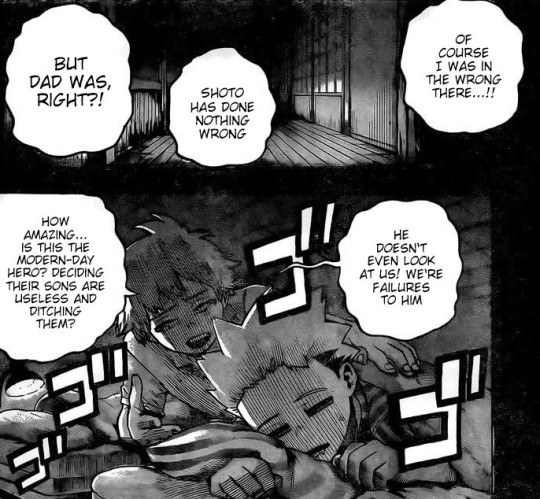
apparently during the five year interim Touya actually stopped blaming Shouto and realized Enji was the one at fault. good for him! a bit inconsistent, given what we know happens later, but I assume we’ll get to that in good time
anyway. “yeah man I agree that dad sucks, but it’s the middle of the night and I’m only eight and you’ve been monologuing for the past two hours bro”
LMAO
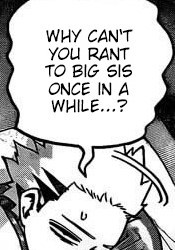
the manga is making my jokes for me, only better. fine then
looks like someone’s still miffed about that disagreement he had with his baby sister back when she was like four
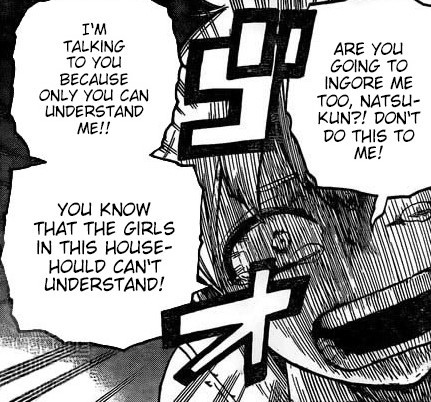
“Fuyu doesn’t get properly riled up like I want her to so ranting to her is annoying.” okay but having been in Fuyu’s shoes, it really is just a different way of coping, and I can guarantee she’s not as fine with the whole situation as Touya might think. but making your peace with something is often a decision that’s made for emotional self-preservation reasons. and I sure as hell don’t fault her for trying to shut out a situation that she had no control over, and trying to make the best of it, and scrape together as normal a childhood as she could manage
and now in Touya’s defense as well, that is of course easier said than done, and I’m sure if there was a “push this button and instantly get over all of the trauma in your life” switch readily available for Touya then he would have pushed it too. unfortunately it’s not always that simple
so now Rei is pleading with Touya not to go train up on his little emo hill again, but it doesn’t seem like much has changed since he was eight
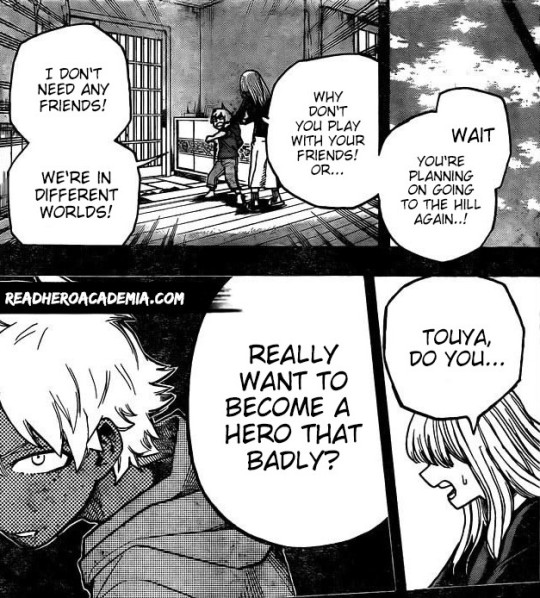
I don’t think he gives two figs about being a hero; he just wants his father to look at him again with pride. fucking hell, stop doing this to me you damn Todorokis
guh, they keep telling him the same thing over and over again
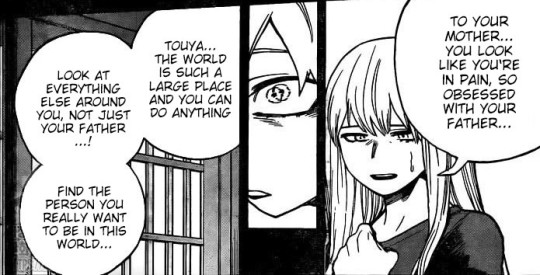
even if we hadn’t already known he was gonna go melt his jawbone off soon, I wouldn’t have expected a line like that to go over well
yep. fuck
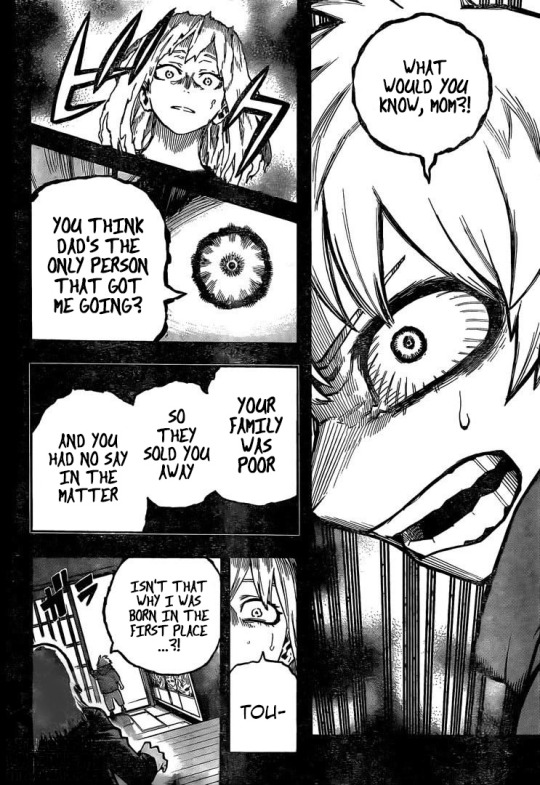
that Todoroki puberty angst, though. nothing else quite like it
“you have a part in this too, Mom” ooooooh man
okay but look, he’s not entirely wrong. like, I’m not saying any of this is Rei’s fault at all! she’s in an impossible situation where she’s afraid to stand up to Enji (who by this point has shown that he’s willing to physically attack her if things get too heated, which is terrifying), and doesn’t really have anywhere to turn for support. her parents aren’t helping much if at all, and Japan in general is just a terrible country to be in when you’re in a domestic abuse situation. everyone’s expected to put on a brave face and deal with their problems all on their own in private. Rei is basically completely isolated at this point, and she doesn’t know what else to do, and so she’s just trying to keep the situation as stable as possible for the kids
but on the other hand, “for the kids” is also where that argument starts to break down a bit, because at this point Shouto is also being physically abused by his father, and the other kids are continuing to be neglected (emotionally if not physically), as they have been for years. so the situation really isn’t stable at all for them. and as a kid, what you end up learning in that type of situation is that you can’t rely on either parent. not the abusive one, certainly, but also not the other one who can’t protect you from any of it. even if they love you and they’re trying, they’re just as helpless as you. Rei is struggling to deal with all of this with one hand tied behind her back, and I get it, and I’m not blaming her at all. but all the same, particularly given that she’s (understandably) putting almost all her focus on Shouto, the end result is that the other kids have basically been left to fend for themselves
so yeah! a shitty situation all around. and one of those cases where it’s not really anyone’s fault (aside from Enji’s), but I can understand the resentment Touya is feeling all the same. and I’m so glad Horikoshi is acknowledging this, because it’s something I probably would have been too uncomfortable to bring up otherwise. as it is it’s still an incredibly heavy subject, and one that I probably have too many personal feelings about
anyway, so once again the whole “we’ll try talking to him and then just shrug our shoulders when it doesn’t work” parenting strategy doesn’t really pan out for the Todoroki fam
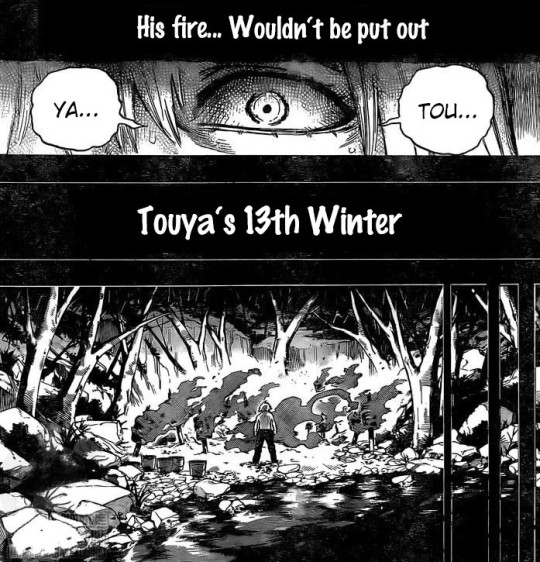
sob this boy is Anakin Skywalkering before our very eyes. all that’s missing is AFO to come and start whispering in his ear. any minute now...
“anyway so then he got taller and his fire changed from red to blue”
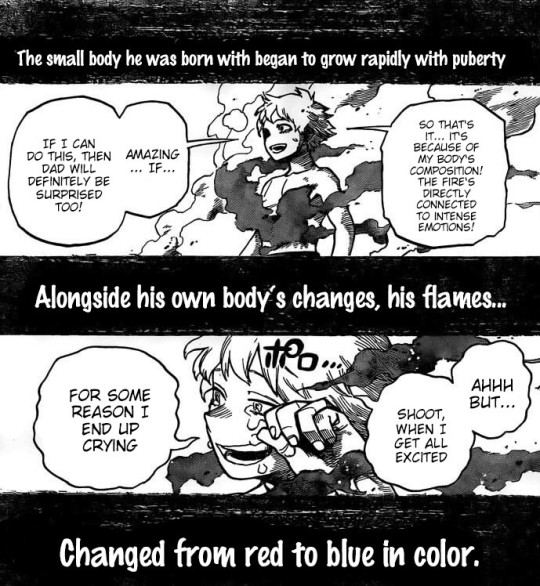
guess we’re getting pretty close then huh. this is the part of the flashback that I really don’t want to see, but also unfortunately the part that I’m most curious about :/
oh for fuck’s --
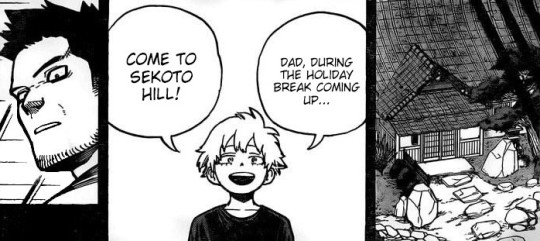
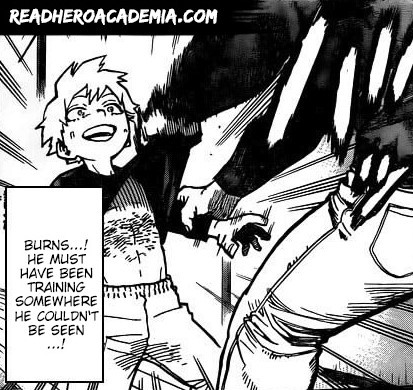
“WHAT DO YOU MEAN IGNORING HIM FOR FIVE YEARS DIDN’T ACTUALLY DO ANYTHING TO SOLVE THE PROBLEM” sob. back to the drawing board I guess
I thought he got taller, why is he still only like a third of Enji’s height here
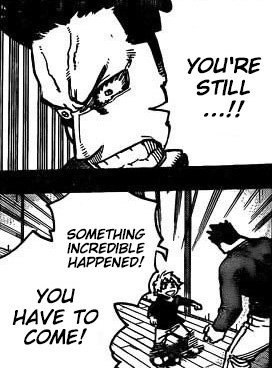
oh fuck me these are armor-piercing feels. this is the heavy artillery right here
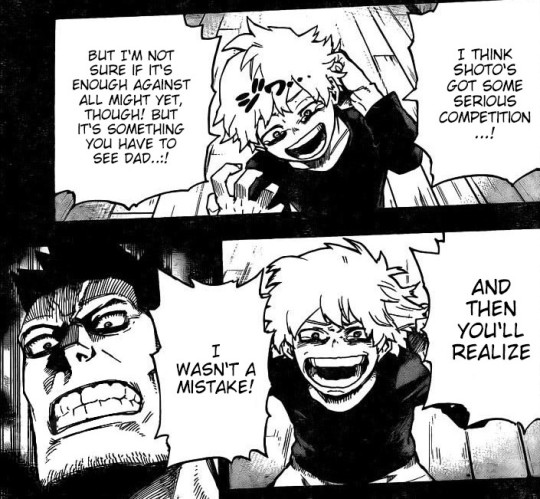
ENJI I’M BEGGING YOU PLEASE STOP AND THINK FOR ONE MOMENT IN YOUR LIFE BEFORE DOING SOMETHING YOU’LL REGRET FOR THE REST OF ALL TIME. your child just told you that he still thinks beating All Might is the only thing you care about, and that he believes his existence is a mistake unless he finds some way of doing that for you. please stop for a moment to contemplate that and choose your next words with care and grace and oh who the hell am I kidding
-- OR WE COULD JUST BLAME REI
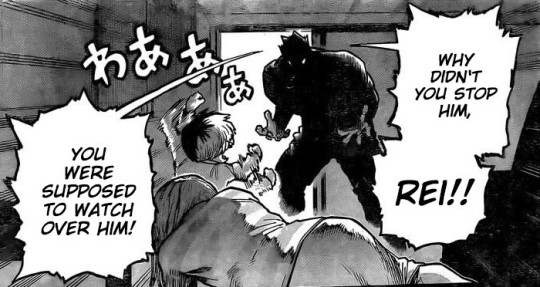
go on and blame everyone but yourself then!! that’s a great solution!! jesus christ man I know this is Endeavor at his literal worst but still this is fucking hard to watch
POOR BABY SHOUTO IS YELLING AT HIS DAD NOT TO HIT HIS MOMMY THIS LITTLE BRAVE BOY NEEDS SO MANY HUGS OH MY GOD
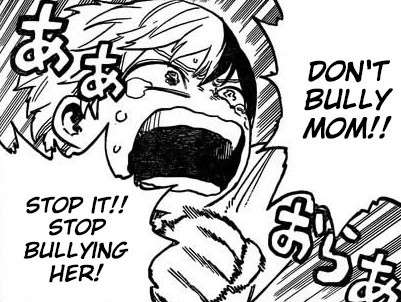
AND MEANWHILE THE OTHERS ARE HUDDLED IN THE NEXT ROOM TRYING NOT TO CRY AH FUCK

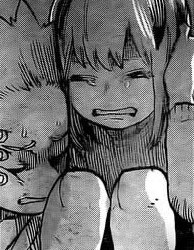
(ETA: Fuyu covering Natsu’s ears cuts RIGHT TO THE CORE OF ME. Horikoshi if you’re really not gonna get these kids some therapy then at least consider giving your readers some. what is this.)
you know it’s bad when you’re starting to think the part where the kid burns to death might actually be a less traumatic thing to cut to right now
holy shit, actual Rei thoughts
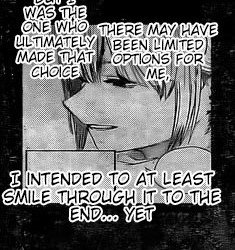
“I was the one who ultimately made that choice” well there we go, wonder if that’ll put that whole argument to bed at last. I doubt it, but you never know. actually who am I kidding it’s not gonna settle jack shit lol
oh thank god, they decided it was getting too intense and cut away back to the present to narrate this next (final?) part
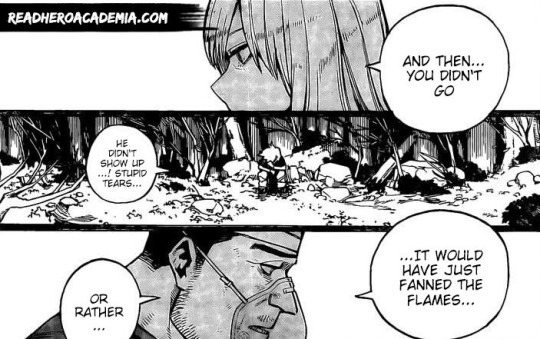
get ready to cue up that Alicia Keys. THIS BOY IS ON FIREEEEEEE
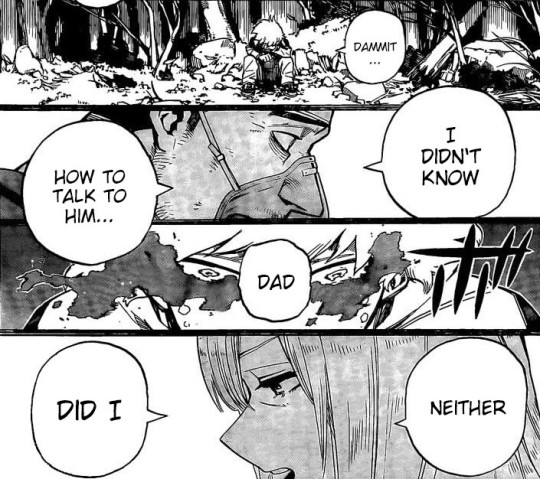
yeah I think that’s one thing we can mostly all agree on. neither of them had any clue what the fuck they were doing pretty much at any point. though I will say that the hypocrisy of him being all “WHY DIDN’T YOU STOP HIM” followed by him IMMEDIATELY DOING THE EXACT SAME THING is a bit rich
(ETA: and he still has this problem, doesn’t he? he froze up when Ending snatched Natsuo, and again when Dabi was attacking Shouto. he’s so afraid of doing the wrong thing that he ends up not doing anything, which of course is exactly what led to Touya’s death. damn Enji I guess you’ve still got some additional character development to unlock.)
and of course neither of them could possibly have known how badly it was going to turn out. like, the consequences here were WAY disproportionate even for the shittiest of parenting. no one expects “I didn’t know how to talk to my son” to snowball into “my son burned to death and then somehow came back as a villain and murdered thirty people”
ohhhhhhhh fuck me
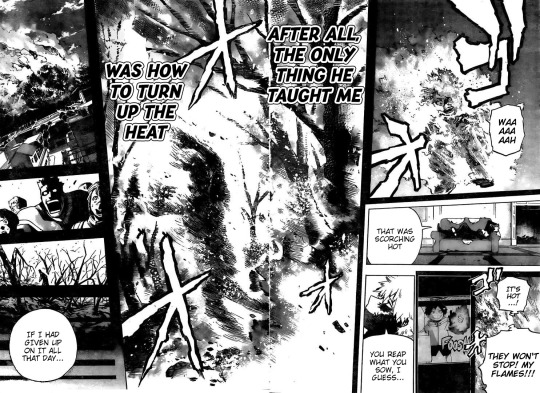
LITERALLY INCINERATED THE ENTIRE HILLSIDE. fuck. and I am so not ready for the scene of Enji finding the remains of his jawbone afterwards. at least we were spared anything super-graphic (for now at least)
I feel like the timeline here is off, btw?? wasn’t Touya’s death supposed to happen after Rei got hospitalized? this might be the first actual retcon of the entire flashback. although I think it makes more sense this way tbh
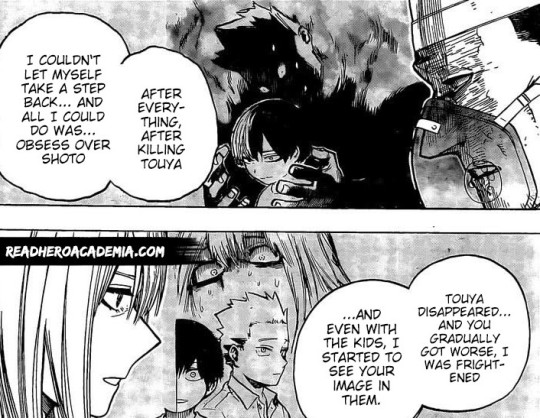
I do appreciate that ten years later Enji is finally reflecting on the fact that if he’d just given up his stupid obsession he could have stopped his family from crumbling apart. that probably sounds sarcastic as fuck, but it’s not. there are countless jerks out there who would have still managed to find a way to blame literally everyone and everything under the sun except for themselves. at least he finally figured out how to take responsibility, even if it came too late to stop his son from dying and being radicalized into a villain terrorist organization
and speaking of, it seems to me we’re missing a third and final part to this little tale of woe, and one which only Touya himself will be able to shed any light on. so we’ll see how that goes
oh man seeing the other kids blaming themselves even though none of it was their fault hits hard af. Rei wasn’t kidding when she said they’d been bearing that burden of guilt far longer than Enji
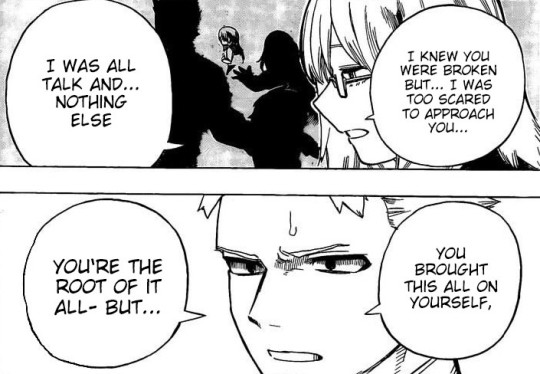
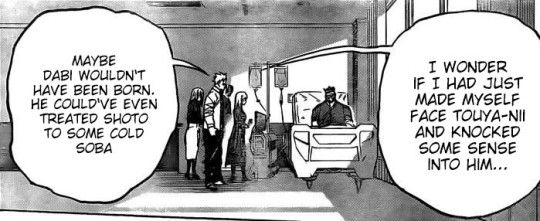
SHOUTO I SWEAR TO GOD IF THE NEXT PANEL IS YOU APOLOGIZING FOR BEING BORN, I WILL... WELL I’LL BE VERY SAD, I GUESS. SO DON’T DO IT
oh good he’s just being quiet. good. it absolutely is not your fault lil bean. it’s not theirs either, but feeling guilty about things that aren’t your fault is a time-honored shounen tradition
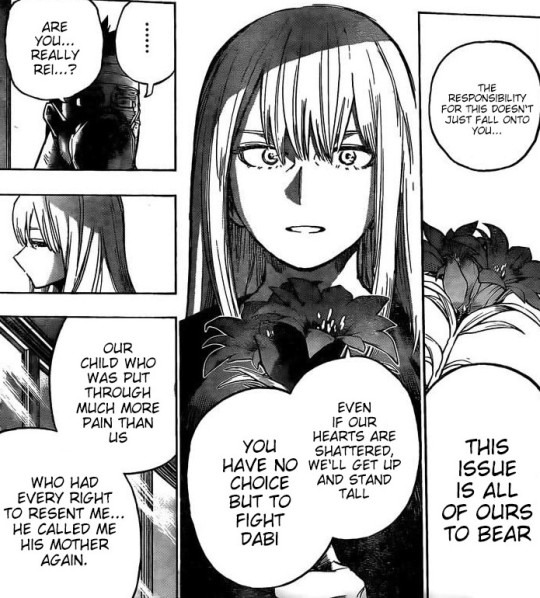
goddammit I braced myself for the angsty Shouto panel a page too early. gotta do it all over again now lol. okay here goes
;_;
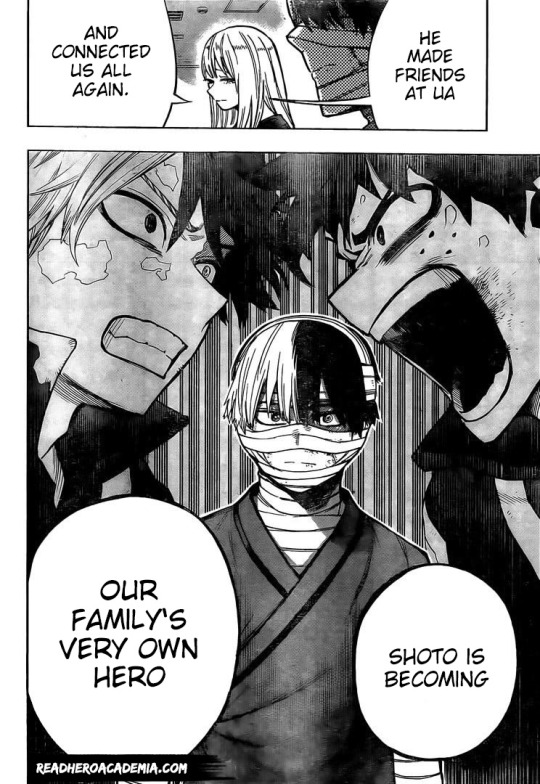
well well well would you look at that

imagine that. talking things out with your child before they make a rash decision. looks like the Todorokis’ parenting skills are finally leveling up
OH MY GOD
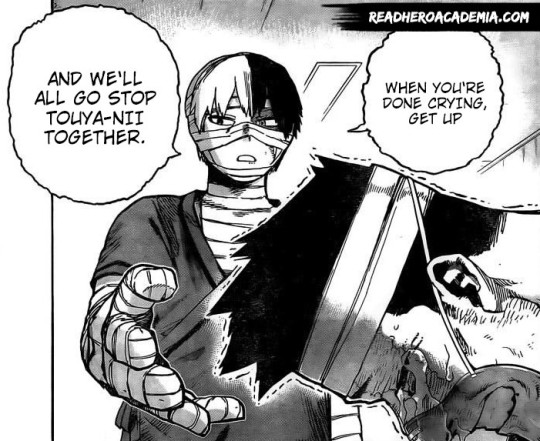
holy shit. this is the most quintessential moment of father/son Todoroki bonding in the entire series. for me it even tops the “nice scar” scene lol. Enji sobbing at the fact that he still has a chance to set things right. and Shouto offering his hand in what is actually the most mature and selfless gesture I’ve ever seen, and being all “we’ll stop him together” to his dad who he hates, but also doesn’t really entirely hate anymore. and all of that is incredibly moving... BUT ALSO HE STILL REFUSES TO MAKE EYE CONTACT WITH HIM AND HE WOULD LIKE HIM TO STOP BEING SO FUCKING DRAMATIC ALREADY IF YOU DON’T MIND. “WHEN YOU’RE DONE CRYING...” fkjldsk
OH MY FUCKING LORD
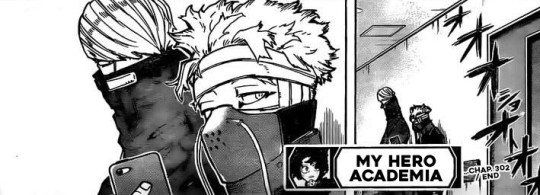
(ETA: wouldn’t be a Todoroki drama fest if there wasn’t somebody listening in on the whole thing in secret just around the corner lmao.)
“you think we should have waited somewhere else?” “yeah, probably.” “are you feeling a lot of secondhand embarrassment too?” “god, you have no idea.” STFU HAWKS IT’S NOT EMBARASSING TO BE MOVED TO TEARS BY YOUR FAMILY ALL COMING TOGETHER IN YOUR DARKEST HOUR TO GIVE YOU HOPE THAT YOU PROBABLY DON’T DESERVE BUT ARE NONETHELESS INDESCRIBABLY GRATEFUL FOR
and anyway you chose these guys as your found family, bucko. too late to back out now. next time go get yourself adopted by the Iidas then
AND MEANWHILE NO WORD ON THE WHOLE “HOW DID A THIRTEEN-YEAR-OLD SURVIVE A FIRE THAT COVERED HIS BODY WITH HORRIFIC SCARS AND MELTED HIS JAW OFF, AND HOW DID HE SOMEHOW THEN MANAGE TO GO INTO HIDING FOR TEN WHOLE YEARS, AND WHAT HAPPENED IN THAT INTERIM TO CHANGE HIS GOAL FROM ‘SURPASS ALL MIGHT TO IMPRESS MY DAD’ TO ‘KILL ALL HEROES TO MAKE MY DAD SUFFER’.” as if we don’t know the answer to that. but still, would it kill Horikoshi to just confirm AFO’s involvement in all of this already. at this point it’s basically just a formality
so here’s hoping next week we’ll either get that, or more Hawks action, or (DARE I EVEN SUGGEST, I’M AFRAID TO JINX IT) finally cut back to Bakugou and Deku and All Might omg. either way I’m hyped
#bnha 302#todoroki touya#dabi#todoroki enji#endeavor#todoroki rei#todoroki shouto#todoroki natsuo#todoroki fuyumi#bnha#boku no hero academia#bnha spoilers#mha spoilers#bnha manga spoilers#makeste reads bnha#my sincerest apologies for this absurdly long recap which is barely funny at all!#THERE WAS VERY LITTLE HUMOROUS CONTENT IN THIS CHAPTER#congratulations horikoshi you win this round
473 notes
·
View notes
Text
Helping Children Cope with Divorce: Dr. Karen Hawk’s Parenting Guidance
Divorce is a challenging experience for all involved, but it is particularly difficult for children. They may feel confused, scared, and even guilty, wondering what the future holds for their family. While parents may be focused on their own emotional healing and practical concerns, it’s crucial to recognize that children also need guidance, support, and understanding. Karen Hawk Gilbert, a psychologist in Gilbert, AZ, offers compassionate therapy and practical parenting strategies to help children cope with divorce. Her approach focuses on providing emotional support, clear communication, and healthy coping mechanisms, ensuring that children can navigate this significant life transition with resilience and stability.
Understanding the Impact of Divorce on Children
Divorce can have a profound impact on children, influencing their emotional, psychological, and social development. Dr Karen Hawk Psychologist Gilbert emphasizes that children may struggle with feelings of loss, confusion, and fear, especially if they have not been prepared for the changes. Younger children might have difficulty understanding why their parents are separating, while older children may grapple with the emotional fallout, including feelings of abandonment or anger.
Divorce often disrupts the child’s sense of security and stability, and it can also affect their relationship with each parent. Children may have a range of emotional reactions, from sadness and anger to withdrawal or anxiety. Dr. Hawk notes that, while divorce is painful, how parents respond to the situation can play a significant role in how children process the change. By providing the right kind of support, parents can help their children navigate the emotional challenges and come out stronger on the other side.
Dr. Karen Hawk’s Approach to Supporting Children Through Divorce
Dr. Hawk’s approach to helping children cope with divorce is grounded in empathy, understanding, and practical guidance. She believes that helping children make sense of the changes in a way that is age-appropriate and emotionally supportive is essential for their mental health. Dr. Hawk encourages parents to acknowledge the emotional pain and confusion their children may be experiencing and provide a safe space for them to express their feelings.
In her therapy sessions, Dr. Hawk uses techniques from Cognitive Behavioral Therapy (CBT) and Emotionally Focused Therapy (EFT) to help children process their emotions in a healthy way. These therapies focus on understanding and reframing negative thought patterns, as well as fostering emotional regulation. By teaching children coping strategies and helping them understand that their feelings are normal, Dr. Hawk empowers them to process their emotions constructively.
Providing Clear and Honest Communication
One of the key components of Dr. Karen Hawk’s approach is clear, age-appropriate communication. Children need to feel informed about what is happening in their family, but they also need information presented in a way that is not overwhelming. Dr. Hawk advises parents to be honest with their children about the divorce while using language that is tailored to their age and developmental level.
For younger children, Dr. Hawk suggests using simple and reassuring language. She also emphasizes the importance of avoiding blaming the other parent, as this can create confusion and additional emotional stress. For older children and teenagers, Dr. Hawk recommends engaging in open and direct conversations, allowing them to ask questions and express their concerns. Providing reassurance that both parents still love them and that the divorce does not change their relationship with either parent is essential in minimizing feelings of abandonment.
Supporting Emotional Expression
Children often struggle to express their emotions, especially when dealing with complex and overwhelming situations like divorce. Karen Hawk Gilbert believes that encouraging emotional expression is crucial to a child’s healing process. Rather than suppressing their feelings or avoiding difficult conversations, children need to be given permission to express themselves in a healthy way.
Dr. Hawk suggests engaging children in activities such as journaling, art, or play therapy, which allow them to process their feelings creatively. These activities offer an alternative outlet for children who might have difficulty articulating their emotions with words. For younger children, play therapy can be especially effective, as it helps them externalize their feelings and process their emotions through play, a natural form of expression for them. For older children, talking through their experiences with a parent or therapist can help them gain clarity and feel understood.
Creating a Stable and Predictable Environment
Divorce can create a sense of instability for children, which is why it’s important for parents to establish routines and consistency in their child’s life. Dr. Hawk emphasizes the importance of creating a stable environment where children know what to expect on a day-to-day basis. This stability provides a sense of security amidst the changes they are facing.
Dr. Hawk advises parents to work together to create a co-parenting plan that ensures consistency in rules, routines, and expectations across both households. Children benefit from knowing that their daily routine—whether it’s mealtime, bedtime, or school schedules—will remain as consistent as possible. This consistency helps children feel more in control of their environment and less anxious about the changes they are experiencing.
Co-Parenting with Compassion and Cooperation
The way parents interact with each other during and after a divorce can greatly affect how children cope with the transition. Karen Hawk Gilbert encourages parents to prioritize cooperative co-parenting for the sake of their children’s emotional well-being. Even if parents are experiencing significant emotional distress, maintaining respect and civility toward each other sets an example of healthy conflict resolution for the children.
Dr. Hawk suggests that parents avoid involving children in adult conflicts or making them feel like they have to choose sides. Instead, she advises parents to model positive behaviors, such as mutual respect and effective communication, which can help children feel more secure in both relationships. The more parents work together to meet their children’s emotional needs, the easier it will be for the children to adjust to the changes brought on by the divorce.
Helping Children Cope with Their Feelings of Guilt
A common reaction for children during a divorce is guilt. They may feel responsible for the separation or worry that they could have done something to prevent it. Karen Hawk Gilbert works with both children and parents to address and alleviate these feelings of guilt. She encourages parents to reassure their children that the divorce is not their fault, emphasizing that the decision to separate was made by the adults, not the children.
Dr. Hawk also helps children reframe their thoughts and understand that they are not responsible for the actions of their parents. Helping children see the situation from a healthier perspective can alleviate feelings of guilt and promote emotional healing.
Encouraging Resilience and Emotional Growth
Although divorce is undoubtedly a painful experience for children, Dr Karen Hawk Psychologist Gilbert believes that with the right support, children can emerge stronger and more resilient. By providing emotional support, clear communication, and consistent routines, parents can help their children build resilience during this challenging time.
Dr. Hawk works with children to help them develop healthy coping skills, emotional regulation, and problem-solving abilities. She encourages children to focus on their strengths, helping them gain confidence in their ability to navigate difficult emotions and adapt to change. By teaching children these valuable life skills, Dr. Hawk sets the foundation for emotional growth and long-term resilience.
Conclusion
Divorce can be a challenging time for children, but with the right support, they can learn to cope and adjust. Dr. Karen Hawk’s therapeutic approach to helping children navigate the emotional upheaval of divorce is centered on open communication, emotional expression, and creating a stable environment. Through compassionate guidance, Dr. Hawk helps parents understand their children’s needs and provides them with the tools to support their children through this difficult transition. With her expertise, children can build the resilience they need to move forward in a healthy, emotionally balanced way.
0 notes
Text
A Study In Jean Moreau
(tw: mentions of Jean's past, violence, mental health and suicidal thoughts/intention to die. let me know if there's something else)
ok, so, i say all the time that Jean Moreau is my favorite and comfort character in All For The Game (i know. it literally hurts but also brings me joy sometimes) and i would literally kill for that man. so, that said, i think too much about him and, consequently, i have too many hcs about him. on request, i will now do what i'm gonna call A Study In Jean Moreau
(my beta reader and best friend helped me a lot with this. thanks @jostenrun)
i'll start with this quote from one of my kerejean fics (https://archiveofourown.org/works/26146540)
During Jean's first four months at USC and playing with the Trojans, he would always ignore Jeremy and put a frown on his face whenever he was in the same place as him. It obviously wasn't the best of strategies to put distance between himself and all the Jeremy glow, but it looked exactly bad enough to work.
Still, Jeremy was all pompous and charming looks at him, always smiling and being polite even though he received much less in return. It pissed the shit out of Jean.
He was used by the Ravens for many years, treated exactly like the exchange item he had been, just possession and obliged to follow lines and lines of rules too strict even for how he should breathe.
Riko was violent, the Ravens were cruel, the Moriyama family was wrong and he needed to repeat this to himself on a daily basis to be able to just keep going.
Back at the beginning of those days, many times he would fight back until he was taught that it was only worse. Many times he would beg until he realized that it encouraged Riko more than it prevented him. Many times he would cry until he was taught that it was wrong.
He would often bleed.
He would often wish to bleed until there was nothing left in his veins, no thoughts in his brain, no air in his lungs, no words on the tip of his tongue—
And he would often try to do just that on his own.
That was his daily life for a long time. Evermore was what he knew, the Moriyama family was who he belonged to and all of that was for what he served. That was it.
How was he supposed to know back then that suddenly overly nice twenty-eight other people would replace all of that with magnificence?
How was he supposed to know that they wouldn't look at him with disgust whenever he accidentally let a curse in French slip away?
How was he supposed to know that the Trojans had complete freedom within the team, instead of having to walk in pairs like the Ravens?
How was he supposed to know that Jeremy wasn't going to hit him whenever he made a mistake?
Or how would he know that Jeremy never considered anything that he made a mistake?
It was all a very big break from reality and so, so suddenly. Jean felt confused at first. Lost, wrong, out of place, stupid and scared.
And Jeremy was always determined to be the best he could be. Jeremy was safe.
Until Jean felt comfortable, confident, fine, and satisfied. He was someone instead of something and he really felt like that.
i think Jean would take years to relearn how to live instead of surviving. sometimes he would fail at that, but so many failures can only lead to success eventually.
he really didn't want to keep playing exy after everything, he doesn't think exy is good at all and trauma made him hate it, but he needs it because of the deal with Ichirou. fortunately, the Trojans are a team big enough to put him in the background for a while, to give him a little rest. but he knows he can't relax too much
he starts therapy. he needs it badly and it takes time for him to really be able to do it, but Jean was never anything but strong, and when he sees the chance to finally heal he knows that, despite how tired he is, despite how many times he wonders if it's worth it to keep going, he needs to grab that and at least try. just one more time. he never wanted to work for anything in his life because nothing was important before, but now he thinks that maybe things are changing
the Trojans get a dorm exclusively for him at first, because they don't want Jean to force himself to share space with someone he doesn't know and still doesn't trust. they want Jean to have his own space and feel safe before anything. he needs that solitude and he knows that it doesn't mean loneliness because his team will always be just a call away from him
he relapses sometimes. days without taking basic care of himself and without getting up from bed, and he no longer remembers whether he’s alive or not. sometimes he's able to call his therapist when that happens, but sometimes he isn't
this is how he gets into the habit of learning poetry. and eventually, writing poetry. he needs a coping mechanism and words seem to be safe enough to float around in his mind and make space in his core
(French poetry that Kevin always dissects for him and tells about the history behind the period in which those texts were written, or about the authors of each text)
the process is slow but it’s progress nonetheless
so, we know about therapy, about not being easy, about difficulties and things happening slowly during the healing process, now let's talk about the little details when things finally start to work out positively. when the best part of Jean's life finally begins
he finds out that his eyesight isn't bad only because of the beatings he took in the nest, and finds it ridiculous when Jeremy offers to help him buy glasses because, according to him, all the glasses Jean likes make him look like a middle-aged man that curses people for fun. Jean doesn't hate it though
Jean learns how to swim and likes it more than he thought he would. he likes the fluidity and movements of the liquid around his skin, how he cuts the water with his body when moving around and how it doesn't hurt him, and he just feels light
Jean likes nutella and chocolate with nuts, because Jeremy used to give it to him after nightmares or difficult days, and it became a comfort food for him (something he wasn’t even allowed to eat in the nest)
Jean's musical taste is a big mess of R&B, soul, pop art, folk, dark pop... he likes artists like Lorde, Aurora, Marina, Sigrid, Sleeping at last and the list goes on
Before he left France, Jean's family had a farm and he was responsible for harvesting fruits and vegetables there. this is one of the last memories he has about France, so he likes to harvest fruits and vegetables whenever he has the chance in the US
Jean loves to read fantasy books. he is a hufflepuff and part of cabin 6 in camp half-blood (children of Athena)
he likes geography. pedology, topography and weather are his favorites. he likes to look at the sky and know how to name climatic phenomena regardless of where in the world he is
(he also likes history and sociology, but only because he can hear Kevin and Jeremy — respectively — talking for hours and hours about those two subjects)
he hates biology
he absolutely hates croissants, tea and coffee. in the morning he always drinks juice or chocolate milk (the latter is Jeremy's fault)
the first time he willingly got wasted on alcohol, he, Sarah and Laila woke Jeremy up in the wee hours of the night while singing in Spanish (Jean barely knows Spanish). he passed out after that and woke up the next day in his room. his first thought was that he was fine even though he lost control of himself around other people, and he cried because of that. Jeremy was concerned because he thought he was crying from a headache or something related to a hangover
Jean can never find shoes his size in conventional stores because he's very big (fucking tall, muscular but not too much, with large shoulders and hips, and eventually a tummy) and, consequently, his feet are also big. he needs to have it personalized and he completely hates it
he loves dogs but is easily scared by them. he couldn't get out of the dorms for almost an entire day after Jeremy's mom's dog barked too loud and it scared Jean. he felt guilty and didn't want people to be mad at him for being so scared of a simple dog
he loves cats though, and after some time into therapy, he adopted a service cat. Kevin and Jeremy always joke about it looking like a replica of Jean himself
Jean doesn't understand the purpose of MMA competitions, because he doesn't like violence and thinks martial arts should be only for self-defense, so he doesn't really understand why people choose to compete over something so aggressive
he also doesn't like the violence in exy, but he forgives because, at least, violence is not the main goal of the sport, but to score points
he learns to draw and starts to open art commissions on the internet. this is his first job and he's proud of it because it was something he achieved by himself
Jean and Jeremy fell in love on the beach
Kevin and Jean take time to forgive each other, especially Jean. the broken heart Kevin left in Jean hurt more than being abandoned by his parents. he suffered from it for years but he didn't really want to blame Kevin. he also knew Riko, after all. he knew how capable of driving someone insane Riko was. it didn't make things easier or less painful though. Kevin and Jean took time, but they never loved each other less
Kevin and Jean fell in love for the second time (the time they could, the time they were allowed) after one of the matches in which their teams were rivals
Jean is very picky for food consistency, and he hates ketchup and mayonnaise for that. he insists all the time that if people knew how to season the food well, they wouldn't need those condiments
(he secretly loves Dijon Mustard though)
Jean was born on 08/31. he’s a virgo
plushies are the first resource that Jean uses when he feels alone but is unable to be around anyone at the moment, so he unconsciously starts making a collection of them. they're all small, except for two that Kevin and Jeremy gave him and are, respectively, a fox and a red and gold trojan. he eventually distributes his plushies to children in local orphanages but keeps those two to himself out of sheer emotional attachment
he doesn't stop suffering because of his trauma throughout his life, but he learns to deal with it. that's the point of everything. he never thinks he will magically forget or get over it, but now he is in a different place in his life and he can start working his way to be the best version of himself he can. he doesn't fool himself into thinking it will be easy and fast, he never thought it would be less difficult than it really was, but he takes things slowly and carefully and hopes it works
his entire healing process is too complex and extensive to explain everything here, but i did the best i could and now i really need to stop because i could stay here ranting for days. xx
#Jean Moreau#all for the game#aftg#the foxhole court#the raven king#the king's men#Jeremy Knox#Kevin Day#USC Trojans#Healing#i love him too much for my own good#this man deserves the whole world and i'll stand for that#Kerejean#Jerejean#Kevjean
83 notes
·
View notes
Text
5 Reasons Why Young Adults get Depressed
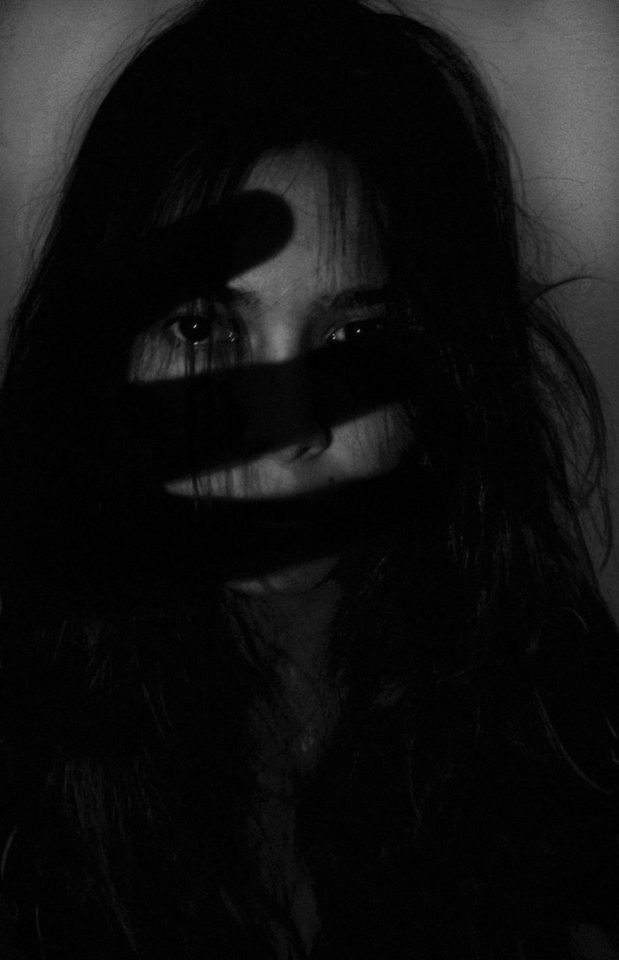
There is a gross misperception that when an individual enters young adulthood (between the ages of 18 to 29) they transition into a state of bliss, fun and contentment. On the contrary, it can be extremely difficult to adjust when transitioning from adolescence into adulthood. For many in that age group it is a time of major adjustment, self-discovery, and uncertainty about life. Studies show that mental health problems, social stress and substance abuse issues are prevalent within that age group. There are many factors that may trigger depression among young adults, five of which are mentioned below:
1. Loss of Significant Friendships
Oftentimes not much thought is given to the tremendous value of friendships in the life of a young adult. Transition to college seldom results in separation between friends as elementary and middle school disperse to various colleges and universities. Additionally, after graduating from college the young adult may return to native town and may be losing friends gained during undergraduate studies. Finding authentic, valuable, selfless friendships can be challenging. This separation can be extremely difficult as, with the loss of support comes feelings of loneliness, sometimes abandonment and depression.
2. Increased Responsibilities
The demands of transitioning into adulthood can be quite overwhelming. This task can be daunting especially for those who were sheltered child by ‘helicopter parents.’ In addition to having to do laundry, prepare meals and pay bills, a young adult also has to take on the task of parenting him or herself, find employment and may have to support him or herself financially. This stage of life is also where those who are in entry-level jobs struggle to adjust to structure and accountability of the position. Some may get married or become a parent which can further complicate the individual’s ability to adjust to major life changes. Increased stress is especially challenging to those who are ill-equipped with healthy coping strategies and independent living skills.
3. Living Their Parents Dream
Parents and well-wishers often say their goodbyes to college students with a complimentary directive to ‘ace all classes, stay out of trouble and make us proud.’ Many young adults who are first-generation college students say that there’s even greater pressure placed on to succeed so they can earn a substantial income to care for the extended family. Such a charge to achieve places an enormous burden on the individual. The insurmountable pressure to live up to the expectations and traditions imposed loved ones has contributed to much psychological mayhem, substance use and mental health problems such as depression and anxiety in young adults.
4. Uncertainty About the Future
Do you remember the first time someone asked you about your professional aspiration? It is common practice for adults to ask children what they would like to be. If that child responded with uncertainty, he or she would receive a judgmental disapproving stare and advice about the ideal professional path that should be taken. Very rarely are children told that it is ok to be uncertain about the future. Although well intended, this practice injects fear of failure and confusion into the minds of so many young adults who are made to feel that uncertainty about their professional future is a character flaw.
5. Fear of Failure
It is customary to condition individuals to fear failure. By age 18 one will have witnessed and possibly experienced dire consequences for failure. Many of us were never taught to embrace failure and use it as an opportunity to examine underlying causes for the failure, re-strategize and keep trying until we succeed. High expectations, uncertainty about the future, and self-doubt can inhibit a young adult’s ability to maximize his or her potential. The fear of failure also contributes to self-doubt, anxiety, depression, and perfectionism.
Young Adults who struggle with Depression can seek the following remedies to help them cope with life’s stressors:
Individual Therapy to address irrational thoughts about self and develop self-assertion skills
Life Coach for assistance to develop power skills
Psychiatric Care
Access a Support Group
Set Personal Boundaries for Family and significant others who impose expectations contact us.
0 notes
Text
Attachment And The Crucial Role Of Early Parenting In Shaping Our Relationships
Have you ever caught yourself questioning why you find comfort in people? Or why you cannot, for the love of God, have an intimate relationship with family, friends or even a romantic partner? Why do some of us have the desperate need to be loved even if it means compromising ourselves? Why do we constantly seek validation and reassurance? Why do we struggle to confront unpleasant and unwarranted situations?
In the early years of our lives, our interactions and experiences give shape to our thoughts, emotions, and behaviour. They influence our perception of the world as a safe place, brimming with life and adventure or as a dangerous and fearful place.
Visit a top hospital if you are interested to know more about the role of early parenting and attachments.
Let’s Look at an Example!
Have you seen infants with a strong attachment to their favourite toy or blanket? Though it is not their mother or father, they have positive feelings of love, affection and comfort associated with it. As they grow and become more positively aware of themselves and explore the world around them, they can abandon these objects. Lauren Schapiro, a psychotherapist explains. “Stuffed animals serve many different purposes for children and even adults. Some use stuffed animals to connect them to important relationships or past events in their life. Others may use them as a coping strategy when dealing with life stressors. Regardless of the reason, it is completely normal.”
What is Attachment?
We form a close emotional bond or attachment with our parents and caregivers who shower us with love and affection and reciprocate our gestures as babies. We seek comfort in their arms and feel happier and more secure in their presence. While this may seem insignificant, it is in fact a foundation on which we build a sense of trust and an optimistic expectation of the world.
What is the Role of Early Parenting?
"It's essentially how we were emotionally cared for—or not cared for—as children growing up," Lippman-Barile explains.
This goes to show that parenting styles are very crucial for the optimal development of a child. A child that is securely attached to the parent or caregiver is open to experiences while having the assurance of returning ‘home’. When parents are sensitive, affectionate and accepting, they raise confident children ready to take on the world.
On the other hand, parents who are overly strict disciplinarians or constantly criticize and nit-pick, raise children who are anxious and constantly fear the real world and hesitate to go beyond their comfort zone. They throw tantrums and cry when separated, constantly demanding attention. Such an insecure attachment can emerge in many forms including anxious or ambivalent attachment, avoidant attachment, and disorganized attachment.
Secure Attachment
“The best inheritance a parent can give their child is their time each day.”
How does secure attachment show up in adults?
Children who live in a nurturing and supportive environment do not shy away from intimate relationships.
They are open about their feelings and emotions, maturely conveying them.
They can set healthy boundaries for themselves without experiencing overwhelming amounts of guilt.
They can bond in healthy and longer-lasting relationships, modelling the ones they grow up around.
They have a strong social support system and have empathy and compassion towards themselves and others, thus showcasing powerful intra and interpersonal intelligence.
They show higher emotional intelligence and self-confidence.
Anxious Attachment
When a child’s basic comfort needs are ignored and overlooked, he develops extreme distrust in the world and the people around him. This is manifested in their adulthood as an anxious attachment.
Parents who show inconsistency in meeting the belongingness and comfort needs of their children make them more vulnerable to such an insecure attachment. They occasionally express love and affection towards their child, providing a thriving environment. While sometimes, they turn a deaf ear towards their emotional and physical well-being or appear intrusive and over-indulging.
These adults show unhealthy levels of anxiety and insecurity in dealing with others or entering an intimate relationship.
They crave reassurance and validation but also tend to feel unworthy of love.
They assign excessive importance to others and indulge in people-pleasing behaviour.
They may appear desperate and clingy, while in reality, they fear abandonment.
They are often overwhelmed by uncontrollable feelings of jealousy, insecurity and over-possessiveness.
They seem to be moody or unpredictable.
They are in a constant state of hypervigilance, anticipating instability in relationships.
Dominant negative self-image.
Avoidant Attachment
Insecure attachment may show up as avoidant attachment, in which the adult often suppresses emotions and tends to avoid uncomfortable situations in relationships as they were neglected as a child by the caregiver or parent. Such parents are unavailable, emotionally distant and forsake their responsibility to nourish the child. They may discourage the expression of emotions and over-discipline their children and resort to punitive measures.
Click Here to Read More...
0 notes
Text
Conduct Disorder - Why Children Get Aggressive

Conduct disorder is a psychological and behavioral issue typically diagnosed in childhood or adolescence. It is a persistent pattern of behavior that violates the basic rights of others or societal norms and rules. Individuals with the problem often engage in aggressive and destructive behaviors. These are usually physical violence, bullying, animal cruelty, property damage, theft, and deceitful or manipulative acts. It is an increasingly prevalent mental health disorder with a pattern of persistent behavior. It violates social norms and the rights of others. Symptoms of Conduct Disorder can manifest in a variety of ways. These range from hostile, aggressive, and destructive behavior to deceitfulness and theft. Unsurprisingly, this reality has profound effects on those living with the disorder as well as having its impact – both directly and indirectly. Understanding the Behaviour of Children As a parent, understanding a child's struggle with Conduct Disorder can feel like wading through murky waters. It is an often-misunderstood condition, marked by persistent aggressive and other disruptive behaviors. It is a violent condition that disrespects the rights of others and goes against accepted norms. The behaviors of children with Conduct Disorder are perplexing and seemingly irrational. It ranges from extreme risk-taking and reckless abandonment of rules to self-harm and other violent tendencies. But beneath the surface, there are often psychological and emotional factors at play, such as trauma, depression, and anxiety. It is essential for parents to recognize the underlying causes of Conduct Disorder in children. They must seek professional help for coping strategies and treatment options.' 1. Definition It is a psychological condition in which children have difficulty following rules and behaving in socially accepted ways. It can cause disruptive and even violent behavior, including fighting, stealing, and property destruction. Parents and caregivers may find it difficult to understand and manage CD. That is why it is important to be aware of the various coping strategies available. These range from cognitive-behavioral therapy to family therapy; no single approach works for everyone. To support their child, parents, and caregivers should be prepared to use a variety of approaches to help their child manage their disorder and lead a more productive life. 2. Signs and Symptoms Conduct Disorder in children is a serious behavioral issue that should not be taken lightly. Symptoms range from aggression, destructive behavior, and deceitfulness. Often, these behaviors are seen as part of typical development in children, however, if these behaviors persist and become more severe, they can be classified as a conduct disorder. The National Institute of Mental Health provides more information on signs and symptoms of conduct disorder as well as treatment options. Treatment for this problem can involve therapy, medications, or a combination of both. If you or someone you know is struggling with Conduct Disorder, it is important to seek professional help. Some Common Signs and Symptoms - Aggression towards people or animals: This may involve initiating physical fights, bullying, cruelty towards animals, or forcing others into sexual activity. - Destruction of property: Individuals with the issue may intentionally damage or destroy property belonging to others or themselves. - Deceitfulness or theft: Lying, shoplifting, or breaking into houses or cars are examples of behavior associated with conduct disorder. - Serious rule violations: Repeatedly running away from home, truancy, or disregarding curfew and other rules established by parents or authority figures. - Lack of empathy: Individuals with conduct disorder may demonstrate a lack of remorse or empathy for the harm they cause to others. 3. Causes Conduct Disorder in childhood is complex. While no single cause exists, several factors may lead to a struggle, such as genetic inheritance, environmental influences, and differences in the brain. It's important to note, however, that having any of these doesn't guarantee a diagnosis. Symptoms may include aggression, defiance of authority, bullying, stealing, and property destruction. If these behaviors become persistent, it could be a sign of a deeper issue. 4. Treatment When treating Conduct Disorder in children, no single approach works for everyone. A combination of therapies, like family therapy, cognitive-behavioral therapy, and sometimes medication, helps manage it. Family therapy teaches parents how to respond to their child's behavior, while cognitive-behavioral therapy helps the child understand and control their emotions and impulses. Medication may be prescribed in more severe cases. It's challenging, but with the right combination of treatments, a child can learn to manage their Conduct Disorder. 5. Living with Conduct Disorder Living with Conduct Disorder can be tough for children and families. But there are positive strategies that can make it more manageable. Remember, children with Conduct Disorder aren't bad, they are dealing with a medical condition that requires intervention. Creating a supportive environment, maintaining consistent rules and expectations, and helping the child develop problem-solving skills can help them cope and develop better social behaviors. Communication between the child and their caregiver about feelings, needs, and frustrations is critical. Additionally, involving professionals such as child psychologists or therapists can equip the child with the tools they need for success. Positive Strategies for Children with Conduct Disorder can significantly improve a child's quality of life and help them become successful adults. 6. Support When supporting a child with Conduct Disorder in Children, remember it's a complex condition. While there are various treatments, developing a positive relationship and providing a secure environment is key to managing it. Involving family and health professionals can help work out the best approach. To understand and support a child, tailor treatments to their individual needs and challenges. 7. Prevention It's essential to recognize potential risk factors for conduct disorder in children. While there is no one-size-fits-all solution, poverty, unstable family dynamics, a lack of social support, and neurological issues can all increase the risk. To reduce the likelihood of developing this disorder, parents and caregivers should create a stable and supportive environment and give children access to mental health services. Taking these steps can help children thrive and boost their overall well-being. Last words Conduct disorder is a serious mental health condition that can cause significant disruption in a person's life, and those around them. It is a disorder that can manifest itself in many ways, from aggressiveness to stealing, and has an effect on how a person interacts with their family, peers, and the broader community. It is a complex disorder that requires a comprehensive and individualized treatment plan to be effective, and it is important to recognize that it is a disorder that is capable of being managed with the right help. With the proper support, those affected can learn to navigate their challenges and live a life of quality and purpose. Image by user3802032 on Freepik Read the full article
0 notes
Note
On one hand yeah this is gorillaz and the writers will always tell us it isn't that deep...on the other hand, I want to hear about the attachment theory stuff pertaining to Murdoc👀👀 (You don't have to if you dont want to, but I am interested lol)
Yeah, sure! I’m going to try not to make this too long (though it probably will be lmao) because it’s definitely just a cartoon. However, it’s also difficult for me to analyze and work with Murdoc’s character without applying the lens of my profession. It’s what I do 40 hours a week! I can’t help it. So…anyway…
Basically, humans are social creatures. We’re biologically wired to attach to a caregiver, any caregiver, even if that caregiver is distant, cruel or rejecting. We start attaching to out mother’s voice in the womb. Mirror neurons (which enable emotional attunement with caregivers) start functioning as soon as a baby is born. Though we all grow into emotionally and physically independent beings, we get our first lessons in self-care from the way our caregivers care for us. Our ability to self-regulate depends significantly on how harmonious our early interactions with our caregivers are. Babies can’t regulate their own emotional states and rely on caregivers to teach them. Some examples: getting held and rocked into calmness when scared, being provided with a bottle when hungry etc. Through this, babies learn to associate intense sensations with comfort which forms the foundation of self-regulation. This becomes a ket component of secure attachment which in turn leads to healthy coping as the baby grows into adulthood.
Not every baby becomes securely attached, but they will develop a coping style based on their attempts to form a connection/get their needs met. Attachment researchers have identified three attachment strategies that babies apply depending on the response they receive from the caregiver: secure, avoidant and anxious. I’m not going to go into detail about what each specific attachment style is outside of anxious since that’s what I lean towards when thinking about Murdoc. Bessel van der Kolk describes anxious attachment as “feeling but not dealing.” Mary Main writes that children who anxiously attached believe that “unless they make a spectacle, nobody is going to pay attention to them.” They become upset when their caregiver is absent, but derive no comfort from his or her return. They stay angrily or passively focused on their caregiver, even in situations when other children would rather play.
To bring all of this back to Gorillaz - basically think about Murdoc growing up with Sebastian. While we don’t know a lot about Sebastian, we can glean from ROTO that he didn’t provide much, if any, comfort or affection to his sons. He likely wasn’t able to self-regulate very well considering how much he drank. Basically, there was no secure base provided to help Murdoc learn even the most basic distress tolerance. When I think about what his interactions with baby Murdoc might have been like, “harmonious” doesn’t come to mind. Murdoch was likely met with frowns, yelling and physical violence. And as we see in Gorillaz, this leaves him vulnerable to even more trauma (the diner lady, bullies at school, prison). addiction and difficulty managing emotions and forming empathy towards others. Like, I know it’s just Gorillaz but whether they meant to or not, Murdoc’s life trajectory thus far is consistent with the research out there are trauma.
Russel, Noodle and 2D my not be Murdoc’s parent’s, but I couldn’t help but think of this when I watched the videos for “Desole" and “Aries.” He’s a full-grown adult, but he’s still human and he still seeks out connection, even when he acts like he isn’t. He’s admitted that he has abandonment issues (linked to anxious attachment). I saw all of that when he was crying on the couch, and later when he was shown stabbing 2D with truth serum even though, as many people pointed out, 2D would have likely talked to him. But idk if he does what he does because he needs a reason. He just wants to make sure he has attention because that was likely the only way he ever got Sebastian or any other adult’s attention growing up. It isn’t healthy and it isn’t good and we’ll see where the canon goes from here, but if you were curious about the kinds of things that go through my brain when I watch him in videos and read his interview answers then here’s a glimpse. I’ll always hope for the best for him. He’s been through a lot. 😭
#asks.#lmao let me nerd out for a moment#dased-n-confuzed#can go on anot more of anyone has any questions#long post#murdoc#ref#discussion
79 notes
·
View notes